Read Dan Harrison’s profile on Simon Jordan, former Chair of Crystal Palace

Profile
Matt Holland speaks to Guardian Columnist George Monbiot

OxYou
Jack Jacobs takes us through the typical Oxford BOP



Jack Jacobs takes us through the typical Oxford BOP
a majority of 791 (56%) voted to remain affiliated with 589 (42%) wanting to disaffiliate. The remaining 2% abstained, and the result is binding on the SU since quorum was met.
This means that the SU will remain affiliated with NUS, the second time that the Oxford student body has voted to remain affiliated after a previous referendum in 2016.
The Oxford student body has voted to remain affiliated with the National Union of Students after a referendum over the past three days. With a turnout of 1409 (5% of the student body)
As part of the referendum procedure, two Official Campaigns were established, with one group campaigning for a positive response and the other a negative. The successful Vote Yes to NUS campaign was led by Anas Dayeh, which put out a campaign statement saying, “NUS is a powerful voice for students across the UK, representing more than 7 million students from over 400 institutions.” However, they also acknowledged that, “The NUS is not perfect, and it has its challenges and limitations.”
The Say No to NUS campaign was led by Ciaron Tobin and Caleb van Ryneveld, who argued that the NUS is, “An institution in crisis”. They said “the NUS cannot act as an advocate for Oxford Students in the national discourse.”

Oxford staff with upheld complaints of sexual misconduct against them have been allowed to remain at the university.

According to a Freedom of Information request made by The Oxford Student regarding sexual misconduct at the University of Oxford over the past five years, from 2017/18 to 2021/22, there were a total of 12 sexual misconduct complaints against staff members.

Read more on page 3
The referendum asked students the question “Oxford SU is currently affiliated to the National Union of Students. Should it continue to be affiliated: yes or no?”. The referendum was held after a motion to hold such a referendum was proposed by Ciaron Tobin and seconded by Mundher Ba Shammakh in Student Council. Both proposer and seconder were former NUS delegates, and, in their motion, they noted that they had seen the value of NUS over the last year.
The vote was held from 8am on Monday 27th February to 6pm on Wednesday 1st March and has been conducted by
Of these, five student complaints of staff sexual misconduct have been upheld, but only one staff member was suspended and subsequently dismissed.
Three of the staff members received formal warnings. In one case, the employee was also mandated to undergo harassment training, while in another case, the staff member was barred from student contact.
Read more on page 4
The last time such a referendum was held was 2016, which drew a turnout of 27.7%. The referendum was held after accusations of antisemitism were made against the then newly
“Mr Mackintosh facilitated a severe threat to the safety and privacy of Oxford Union members,
- Hamzah Mahomed, proposer of the failed no-confidence motion in the Union presidentRead more about the protests against the Israeli Ambassador visiting the Union on page 4
EDITORS IN CHIEF
Anna Davidson and Milo Dennison
ASSOCIATE EDITOR
Ayomilekan Adegunwa and Susie Barrows
CREATIVE DIRECTORS
Yii-Jen Deng and Blane Aitchison
STRATEGY
Dominic Enright (Director), Anmol Kejriwal, Jason Chau, Andrew Wang
DEPUTY EDITORS
Rose Henderson, Matt Holland, Dani Kovacs, Emily Hudson, Florence Allen, Martin Alfonsin Larsen
NEWS
Rose Henderson, Ayomilekan
Adegunwa, Samuel Kenny, Anna Lee, Gabrielle Thompson, Ali Khosravi, Rosalie Chapman
COMMENT
Matt Holland, Ali Khosravi, Tara Earley
PROFILE
Matt Holland, Ryan Teo Chee Shan, Samuel King
FEATURES
Anvee Bhutani, Haochen Wang, Tara Earley, Rosalie Chapman
IDENTITY
Florence Allen, Vivian Gu
PINK
Blane Aitchison
ENTERTAINMENT
Martin Alfonsín Larsen, Natascha Norton, Cosimo Schlagintweit
FOOD & DRINK
Susie Barrows, Asmaani Shukla GREEN
Emily Hudson, Jasmine Wilkinson, Anna Bartlett
SCITECH
Emily Hudson, Nicole Hasler, Archuna Mohan
SPORT
Dani Kovacs, Joe Sharp, Bradley Beck
OXYOU
Susie Barrows, Jack Meredith, Jack Jacobs
COLUMNISTS
Elena Buccisano, Matthew Taylor, Liberty Osborne, Blane
Aitchison, Jonah Poulard, Amanda Li, Efan Owen
How time flies. It seems only yesterday I missed the deadline to apply for Cherwell, and yet here we are. Having laid in the last edition, myself and Milo are preparing to interview our successors, asking them the questions we wish we would’ve asked ourselves: ‘don’t you have exams?’; ‘no, don’t avoid the question, how much experience have you got with InDesign?’; ‘you’ve put down time management - are you absolutely sure about that one?’.
It’s been as exciting a term at OxStu as it’s possible to have while being unable to afford to consult lawyers. We’ve had highs - thrilling news stories, interesting content, the pages that Yii-Jen designed - we’ve had lows
- that one about burger king closing down, anything I’ve played any part in, the ones that she didn’t. I’ll miss it terribly, and without sounding too much like I’ve got little going on in my life, it’s been the highlight of my time at Oxford.
There is, I suppose, one person without whom I wouldn’t be writing this. I mean this literally, as he spends most of his time chasing me about my editorials. Milo Dennison is not only hugely talented, he’s also pretty nice - like a journalist but with morals and stuff. When we had one of our final meetings the other day, we read over the assessment of candidates which resulted in our being chosen as EiCs, and now knowing the full extent of Milo’s advantages and disadvantages, I can safely say I’d still have him over anyone in the world. Thank you Milo. I also have to thank everyone on the team, and in particular Dani, Matt, Emily, Martin, Blane, Rose, Ayomi and Susie. Thank you.

And just like that, it’s all over. 4 dodgy editorials, 128 pages, 196,436 views on the website in February, 43 members of the OxStu team and 1 amazing co-Editor in Chief later, my time as Editor in Chief is coming to an end. It’s been an astonishing term for OxStu, breaking all sorts of stories and publishing more varied content than ever before. It’s been a privilege to head up OxStu this term and to get to know so many interesting people through this role. From accusations of defamation to blunt words from Directors of Press, it has been challenging at times, but it has also undoubtedly been the best experience I’ve had at Oxford.


A huge part of that is my fellow coEditor in Chief Anna, who has been
Stephanie Nourse gives us her Crispy Cauliflower Tacos receipe

simply amazing. From laying in on her birthday to putting up with my “how’s the editorial looking” texts, she has been fabulous. She is a diligent journalist and reporter, but also a lovely person to work with and an excellent, compassionate, leader. Your fellow Editor in Chief has a huge role in determining your own experience, and I can resolutely say that I wouldn’t change Anna for anyone.
Anna and I could not have done this term alone though. Jason and Dom guided us through the early stages of setting up a team, while the entire deputy editorial team have carried the paper. Special mentions must go to Rose, an inspired choice from Anna and I as Head of News if I do say so myself, Susie and Ayomi, associate editors who have supported us through this whole thing, and Matt, as lay-in extraordinaire. Good luck to our next Editors in Chief - try not to defame anyone and you’ll be halfway there.
Rewriting Roald Dahl
An American in Paris Review 30

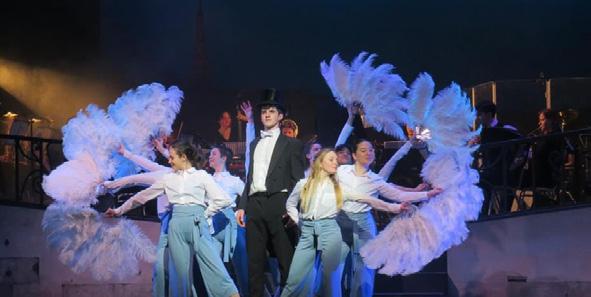
An away day at Oxford United 28

Thewhole team has been great this term, but for my last editorial, I would like to give a special shout out to some members of the team. Bradley Beck - despite being at the same college, we have never met, but your articles have been a pleasure to read this term (both me and Rose can vouch for this). Sam Kenny - the Union can be a convoluted and intense environment, but your diligent coverage is both elucidating and entertaining. Matthew Holland - your sections have been impeccably managed, and some really great content has come out of them. Of course, this great work is enabled by our great senior editorial team: the superb associate editor, Susie and the fantastic editors-in-chief, Anna and Milo. Thank you all, it’s been a pleasure.
And thus ends my run at the OxStu. Unfortunately, I have “finals” next term which mean I have to actually “prioritise my degree” (read: I’ll be back doing some non-descript role so I can stay on the groupchats and keep up with gossip). It’s been an absolute pleasure (the bane of my existence) to sit in the SU (actual location TBC) on InDesign every fortnight (getting increasingly raged as I move an image 1mm and the entire page self-destructs). Thanks to Milo, Anna, Ayomi and Rose for the vibes at big lay-in, to Matt for continuing the Portsmouth representation after I’m gone, to Martin for pushing for three Entertainment pages and giving me even more InDesign rage, and to the entire team for being consistently incredible. Enjoy this issue - and thanks for all the fish.
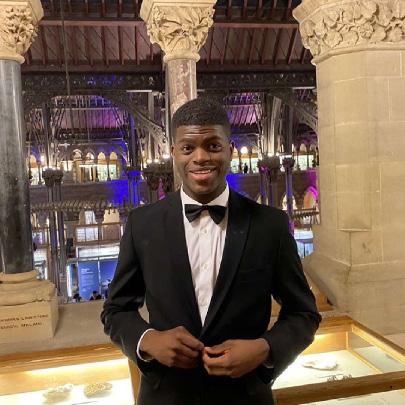
 Susie Barrows, Merton College
Susie Barrows, Merton College


 Rose Henderson
Rose Henderson
Comment - p. 8
Columns - p. 16
Entertainment - p. 22
Scitech - p. 27
Pink - p. 29
Sport - p. 31
Ellie Greaves, the VP Women at Oxford SU, has resigned in order to “prioritise [her] health and wellbeing.”
The news comes after she came under significant criticism at this week’s meeting of the SU Student Council.
Jeea Chadha and Ffion Samuels, the co-chair and LGBTQ+ rep for It Happens Here, the SUassociated anti-sexual violence campaign, were the proposers of a motion to change the wording of a motion passed at the previous Student Council meeting which mandated the VP Liberation and Equality (for this year, VP Women) and VP Welfare to continue preventative work on colleges using NDAs. The changes included mandating the VP Liberation and Equality and VP Welfare to work alongside It Happens Here to organise and attend meetings relating to the preventative work, and to express
News - p. 3
Profile - p. 12
Features - p. 20
Green - p. 26
Food & Drink - p. 28

OxYou - p. 30
“kept on cancelling meetings with me very last minute” and that It Happens Here were not made aware of the time sabbatical officers went on leave.
Samuels also said that Greaves did not act like someone in a professional paid position as “she complained about another campaign to me (…) I can’t trust in that relationship [between the campaign and the sabbatical officer] if she’s going to complain about another campaign.”



a systemic issue when it comes to supporting campaigns. At the end of last term, Clay [the other co-chair] and I were at the centre of a massive national media pile-on and we got no official support from the SU.”
as a Sabb, thank you. I will continue to work on my projects at the SU until the 17th of March. I am hoping in this time to do as much work for students as possible.”
displeasure with the VP for Women.
The VPs would have to include It Happens Here in all discussions regarding NDAs, and be more transparent and professional in their communications about these discussions to campaigns.
Samuels said that they wanted to hold sabbatical officers to “a high degree of professionalism” especially as “members of campaigns are (…) unpaid volunteers.” They said “I’ve spent like two years of my life working on this and it’s actually being made much more difficult with the current VP Women.”
Samuels described how when they had tried to contact Greaves they received no response to their emails over the entire summer, and eventually had to resort to contacting the VP Women on Facebook. Samuels also alleged that Greaves

Chadha said that “It Happens Here has not been treated very well in this situation and it would be really great if the (…) sabbatical officers are held to a higher level of professionality, especially when working with campaigns who are unpaid volunteers.” Greaves was also accused of having “actively caused harm towards our committee members through triggering them through bringing up very difficult, unnecessary things that have really affected their mental health.”
The It Happens Here representatives also criticised the fact that the campaign was only mentioned in the minutes, not in the NDA motion itself, and that the official Oxford SU Records also did not mention Ffion Samuels by name. They said, “we were the ones who drove this project within Oxford, with Ffi even talking to local MPs about this and putting this on a national scale.” They also alleged that Greaves failed to consult with It Happens Here in “any way, shape, or form” in regards to the motion, and that sabbatical officers have taken undeserved credit for the NDA campaign.
Elliot Cooper-Brooke, co-chair of the SU’s LGBTQ+ campaign, said at the meeting, “the SU has
Greaves apologised for “contributing to a trans-exclusionary narrative” after she made comments to The Times and Cherwell about the changes made to the VP Women position which attracted significant criticism. However, her reflections on this incident seem to have contributed to her perceived lack of professionalism with Cooper-Brooke saying Greaves talking about it “puts me in a weird position” and “it’s a bit bizarre to talk to me about that.”
A role review instigated in 2021 expanded the VP Women position to VP Liberation and Equality, with the change taking place from the 23/24 academic year. Kennedy Aliu was elected as the new VP Liberation and Equality last week.
Greaves’ statement in full:
“After much consideration, I announce that I am resigning from my role of VP Women at Oxford SU. I have made this decision to prioritise my health and wellbeing.”
“I am very proud of the work that I have managed to do so far, including running a successful club night, contributing to university information around spiking and having the opportunity to work with so many passionate students. My time as VP Women has been challenging and I have learnt an incredible amount along the way. To everyone who has supported me, whether during my election or throughout my time
“Finally, I hope that we continue to see a culture of respect and kindness grow throughout the Oxford student body, a space for everyone to be welcomed and heard. I wish nothing but the best for the entire SU team, and for the newly elected officers in their upcoming year.”
Contd. from page one
In the other cases, three cases were not upheld, and three members of staff left the university before disciplinary procedures were completed. A further case is ongoing. Student representatives have voiced their disappointment. Sexual misconduct by staff is something that Oxford SU has been lobbying against, particularly via the It Happens Here campaign which works to tackle sexual violence.
The Oxford SU Sabbatical Officers commented, “We are concerned to see Oxford staff accused of sexual misconduct and we hope to work with the University to make sure that more appropriate sanctions are taken in disciplinary cases such as these in the future. We encourage students who would like to voice their thoughts and feelings to reach out to our VP for Welfare and Equal Opportunities. Students are also able to submit this as a motion for discussion at the next student council.”
Rosalie Chapman, the incoming SU VP Welfare for 23/24 added, “Staff found guilty of sexual misconduct should not be allowed to continue working at the university.”
The FOI response also stated that 24 cases of sexual misconduct were reported by students against other students over the same five years. Only two cases were upheld and in each case, neither student was dismissed from the university. In one of those instances, the student was required to undergo training. One case was not upheld. In the remaining cases no further action was taken, either because of “a lack of university context”, or because they were considered a police matter.
The findings come as the Office for Students, the higher education regulator, has launched a consultation on new regulations for universities to tackle harassment and sexual misconduct on campuses. Plans include either forcing staff to disclose relationships with students, or banning staff-student relationships entirely.
A spokesman for Oxford University said, “Oxford Uni-
Over 150 individuals protested the invitation of UK Ambassador to Israel Tzipi Hotovely at the Oxford Union by the Union President, Charlie Mackintosh. The protest was being organised jointly by the Oxford Arab Society, Palestinian Society, Syrian Society.
Chants of “Brick by brick, wall by wall, Israeli apartheid has got to fall” and “Oxford Union shame on you”, “Charlie Charlie you can’t hide. You’re supporting apartheid.” could be heard throughout the town centre, even from inside the Union Chamber. There were also chants in Arabic.
The event saw high tensions from the start. At 6.30pm, as the crowd began to gather on St Michael’s Street, police asked the protesters to move back and threatened to forcefully move them if they failed to comply.
“Under what power? We’re free citizens, we’re Oxford students, this is a public street, and we have the right to stand here” one of the protesters clapped back.
The police replied, “We have orders to ask you to move back, and if you do not comply, we will have to use force to move you.”
“This is our right as citizens of the United Kingdom to be here and protest. You’re actually agitating us,” a protester replied.

There were three members of The Oxford Student present at the event, and one of
versity is working hard to build a culture where our students can feel safe and where sexual violence and harassment are not tolerated. The university takes any allegation of sexual misconduct extremely seriously, but in line with the national picture, we are aware that incidents of sexual harassment and violence are under-reported at Oxford. The university also does not and will not use Non-Disclosure Agreements to prevent the investigation of complaints of sexual misconduct or other inappropriate behaviour, or to prevent responsible whistleblowing; and would like to reassure students that anyone bringing forward complaints of this nature will always be listened to and supported.”
our journalists faced racial profiling by the police in trying to report on the event. All three journalists were questioned, removed from the area, and threatened with arrest by the police.
Protesters further faced what they described as “intimidation” from “hostile” police.
The President of the Oxford Palestine Society, Salma, spoke exclusively to The Oxford Student, “As a Palestinian born and raised in Hebron under Israeli occupation, I was subject to Israeli colonial oppression on a daily basis, from checkpoints and limitations on my right to freedom of movement to daily harassment by Israeli occupation soldiers. All of us Palestinians have friends and family who were killed, imprisoned, or oppressed by the Israeli apartheid that Hotovely is a part of.
“The Oxford Union has invited the Israeli ambassador to the UK, Tzipi Hotovely, to speak to its membership the very same week Israeli forces murdered over 13 martyrs in Nablus, killed a record number of Palestinians with 62 killed since the beginning of the year, and launched airstrikes on Damascus a week after an earthquake costing over thousands of Syrian lives.
“This is the second time in a year that the Union has brought Hotoveley to campus, despite the extremity of her support for violence on Palestinian people. She represents one of the most ex-
treme governments in Israeli history. She has repeatedly called for the annexation of all Palestinian land, pushed for the expansion of racially segregated settlements and incited violent attacks against Palestinians, claiming they are “thieves of history.” She describes the Nakba of 1948, during which over half a million of Palestinians were forcibly displaced from their homes, as an ‘Arab lie’. She is representing a regime of violence, ethnic cleansing, and apartheid.
“There are no two ways about this. Israel is an occupation power practicing all different elements of colonialism, apartheid, ethnic cleansing and violence in all its forms. As a Palestinian, I feel empowered by seeing everyone today.”
One Union member at the protest added, “The Union claims to be a beacon of free speech but silences Palestinian voices.”
The Oxford Student also spoke to a Jewish resident of Oxford who came to support the event. She said, “I’m Jewish and my grandmother was a victim of the Holocaust but I think you should be allowed to protest.”
Police were recording the entirety of events and confirmed the footage would be used to “gather intelligence on individuals who have turned up”. There were also riot-trained police officers on site.
The protest included a significant police presence.
ation, with 3409 votes cast in favour of remaining in NUS, while 2430 voted to disaffiliate.
This referendum was held in light of the damning report into antisemitism within NUS that was published last month. The report, commissioned by the NUS in May 2022, was conducted by Rebecca Tuck KC and laid out numerous incidents of antisemitism within the NUS. The report states that Jewish students were “subjected to harassment” and set out recommendations for the future.
Multiple incidents were ref-
There were over 60 police officers in the area, six police vans, four police horses and a drone. This number increased through the night and the number of police horses doubled.
This is not the first time Hotovely has come to the Oxford Union. She attended an event in Trinity Term 2022 as well where she was interviewed by Mackintosh, who was then the Librarian. This event was also met with protests. The police presence today was exponentially greater than the police presence in Trinity Term, though many of the outcomes like racial profiling and intimidation were very similar.
This comes as there is currently a proposed vote of no confidence against Mackintosh over this event and failure to handle it appropriately in Trinity Term which is in the process of collecting signatures. If it collects 150 signatures, it will then be debated in the House.
The protest ended with protesters walking down George Street chanting “Free Free Palestine”. The police blocked George Street with over 30 officers forming a cordon, including 4 police horses.
In response to the threats and racial profiling faced by The Oxford Student journalists, the Union commented, “We do not control the police or the decisions they make. We have no powers outside the curtilage of the Oxford Union Society. If you feel aggrieved you can contact Thames Valley Police.”
erenced, including the failure to include Judaism on an official form in 2018 when all other faiths were listed and using a prayer room for political meetings. Other issues cited in the report were the election of candidates with a history of making antisemitic comments and a motion to mark Holocaust Memorial Day in 2016 receiving opposition speakers.
The report cited testimony given to the Union of Jewish Students after the 2021 NUS Liberation Conference by a delegate, whose experience at the conference left them “personally shaking and al-
Chief Milo Dennison Editormost in tears”. The NUS reportedly viewed some complaints as being made in “bad faith to try and avert pro-Palestinian or anti-Israel policy advocacy”.
Earlier today, protesters gathered on Broad Street to stand against new transport plans in Oxford, which have proven to be highly controversial. The transport plans include proposals to block residential streets using bollards or planters to stop vehicles cutting through, and to set up six traffic filters to cut unnecessary journeys and make walking, cycling, and public and shared transport the preferred option. Protestors disagree with this, saying that the proposals to discourage driving are an infringement on freedoms and an attempt to control people.
The OxStu spoke to one of the organisers of the protest, who said: “We’re here to come together to say no to 15-minute cities, we’re here because we’re incredibly worried about the attack on our rights, the freedom of movement, and everything that comes from freedom of movement…Most people you speak to here are going to be all for a return to local economies. But this isn’t going to achieve that, it’s going to restrict people’s rights.”
Another protester, from Stand in the Park U.K., stated: “We’re obviously in opposition to this rollout of 15-minute cities and the implications of what that means
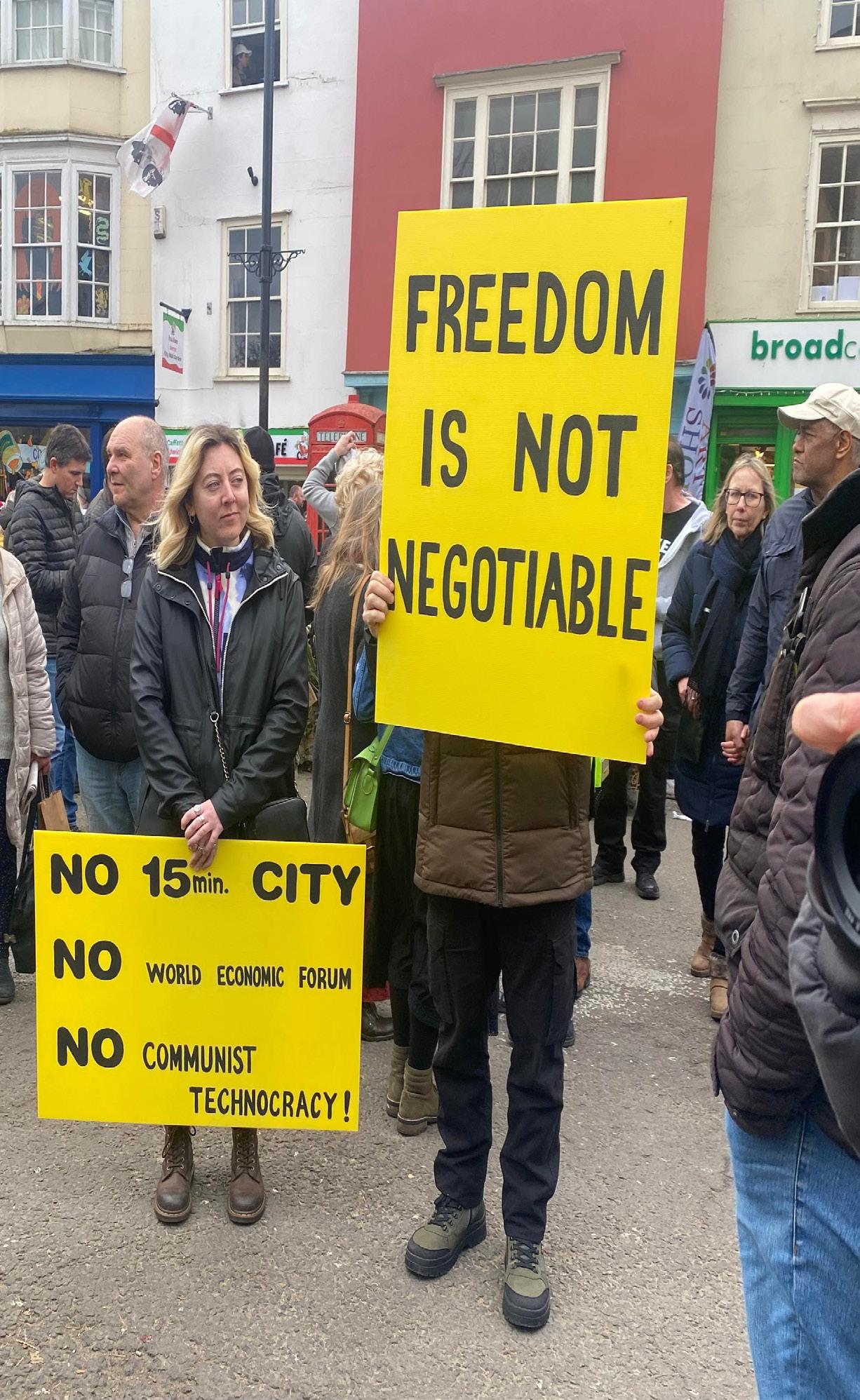
when you are effectively locking people into zones in their own hometowns. It’s made to sound like this wonderful idea because it would be fantastic if we have all these nice little community hubs with amenities within close reach, but the actual reality of what this means is that you are being tracked and traced within your own town. You’re looking at having to have permits to leave the zone that you find yourself in.”
These comments reflect a sentiment frequently expressed by Reclaim Party leader, GB News presenter, and former actor, Laurence Fox, who was also at the protest. Fox has previously raised concerns that 15-minute neighbourhoods are part of a wider plan to control people, often including the push for people to get vaccinated as also being part of this plan. Oxford has become of particular interest to those who share these ideas due to these new transport plans, which have been seen as a great example of this ‘attack’ on freedoms. Many of these claims about the levels of control that people will be under have been exaggerated, as in reality, the traffic filters do not mean that people will be forced to remain in a zone against their will, they only restrict driving.
Police at the scene have been taking measures to ensure the protest goes ahead, with Thames Valley Police stating earlier that: “We anticipate large numbers of people will attend this event and as such, there is a possibility of some local disruption on the day.” The police also said they would “seek to ensure that the event is allowed to proceed peacefully”, and that they recognised the “strength of feeling and the important part that peaceful demonstrations play in society.”
Thames Valley Police have since commented that “our operational objectives were met and the day’s events passed largely in a peaceful manner, with the overwhelming majority of the thousands in attendance, co-operating with officers, while exercising their democratic rights.” Five arrests were made for public order offences, including two for failing to remove their facemasks. The force also thanked “the vast majority of those who attended and conducted themselves in a peaceful and lawful manner.”
With additional reporting by Rose Henderson
Keelan Daye, Returning Officer and Extraordinary Returning Officer, has ruled that the motion of no confidence in Charlie Mackintosh is invalid.
The motion was ruled invalid on the grounds of Rule 47(g)(i) (3) of the Union’s constitution, which states that no Motion of No Confidence shall specify any grounds.
The Returning Officer stated that it was clear that the text of the Motion of No Confidence began with a statement of the grounds on which the Motion had been moved.
The motion was brought on grounds of “gross misconduct” and “shameful capitalisation of his office”.
The Motion had caused controversy in and outside of the Union due to it being raised over the Israeli Ambassador to the UK’s attendance at the Union’s Abraham Accords panel.
The Israeli Ambassador to the UK, Tzipi Hotovely, is known for her extreme views on Palestinians and Israel’s claim to the West Bank.
Last time she was invited, dozens protested the event. There was significant controversy after one student from the Oxford Students’ Palestinian Society was forcibly removed from in front of a gate by police and several others claimed they were racially profiled, manhandled and intimidated. Hamzah Mohomed, the proposer of the no confidence motion,
was one of these individuals.
Some members have raised concerns to the President of the Union that the motion contained “Anti-Semitic” language, especially as the wording accusing the President of “conspiring with foreign agents” is a commonly used trope against Jewish people. Mahomed, told The Oxford Student that the President had told him the motion was an “antisemitic dog whistle”.
Mahomed alleged that in a previous event where Hotovely attended “Israeli security conspired to intimidate and harass members of colour and pro-Palestinian members, stifling debate and meaningful criticism of the Ambassador.”
“Mr Mackintosh facilitated
a severe threat to the safety and privacy of Oxford Union members…These concerns represented an access and equality issue which was not properly acknowledged.”
“She was allowed to make a 30 minute address and no more than 5 questions were taken from the floor,” the motion read. “The President, Mr Mackintosh has failed to uphold members’ expectations for freedom of speech and deliberately conspired with foreign agents to promote the interests of an apartheid state.”
The Motion is said to have received 137 signatures with some confusion over any signatures submitted electronically. The Motion may not have passed even if it had not been ruled out of order.
As per the Society Rules, in order for an impeachment motion to be brought to a vote, 150 signatures must be collected in the next 48 hours. If the required number of signatures is reached within the time period, then a vote can be held four days later.
The Union were adamant that the invitation of Tzipi Hotovely is in line with their free speech values and people are free to voice their opinions on any speaker the Union invites.
A Union member told OxStu “it would be ridiculous if a debating society in the UK couldn’t invite an ambassador to the UK to speak”.
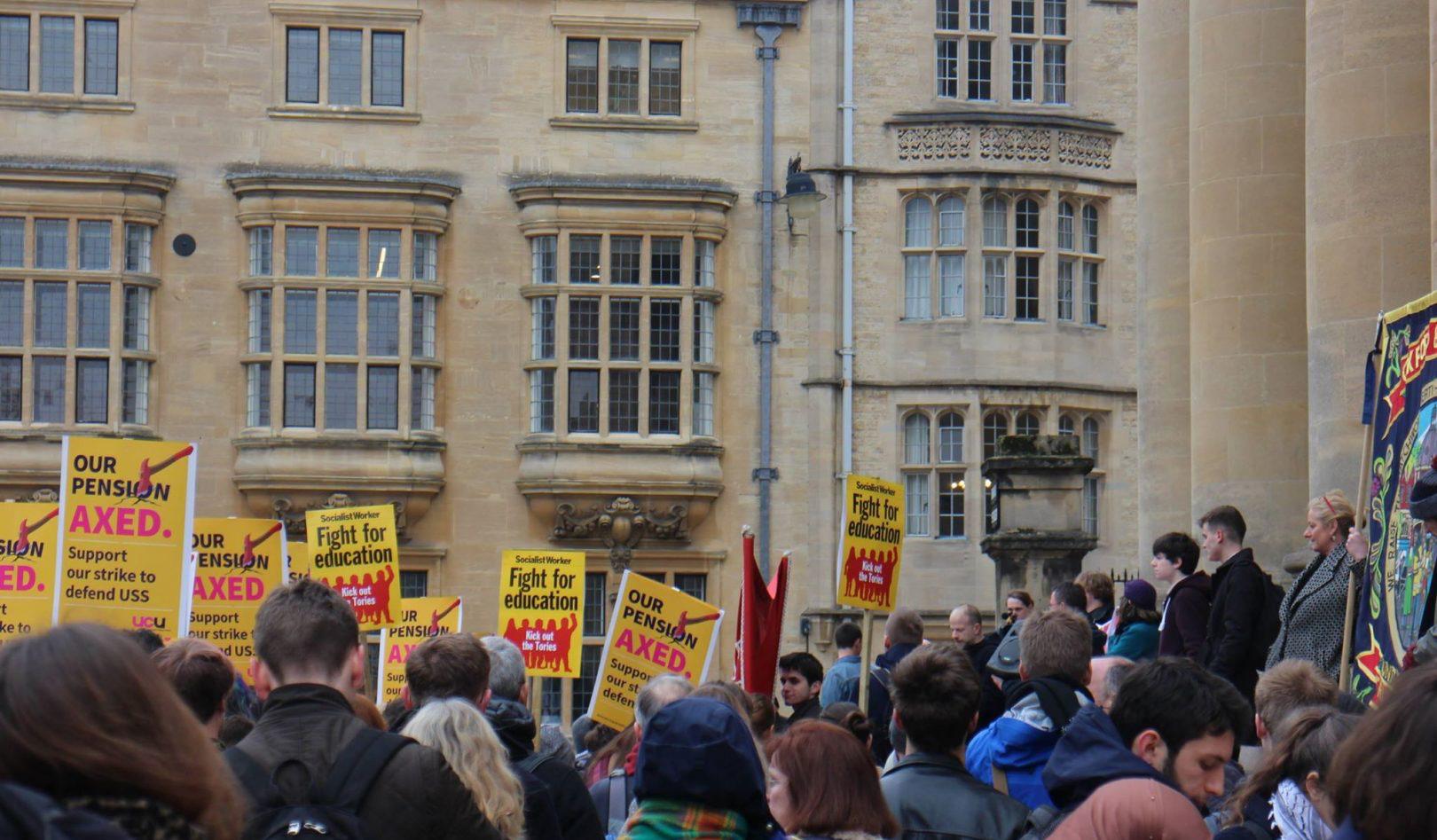 Gabrielle Thompson News Editor
Gabrielle Thompson News Editor
The University and College Union (UCU) have announced their intention to pause strike action for the next two weeks following “significant progress across a range of issues.”
The dates which will now no longer be affected are Tuesday 21, Wednesday 22 and Thursday 23 February next week and Monday 27 and Tuesday 28 February and Wednesday 1 and Thursday 2 March. However, all strike action scheduled for after this two-week period is expected to go ahead as previously planned.
The UCU have described their negotiations with university and college employers as reaching a “period of calm” which they hope to continue by pausing all strike action for the next two weeks.
Jo Grady, general secretary of the UCU, wrote an open letter to supporters to emphasise that this was “simply a pause”, adding employers “will fear us extending our mandate by another six months far more than they will the next two weeks of strike action.”
This timeline will be voted on in a re-ballot on Wednesday, where UCU members can vote to secure a further six months of strike action if it is needed. The open letter asked all its members to vote ‘Yes’ in the re-ballot and encourage colleagues to do the same, potentially placing further pressure on employers if the new ballot is passed.
The general secretary to the UCU described the pause as a “win / win for the UCU and our members”, following stalls between the union and the Universities and Colleges Employers Association
(UCEA) after a proposed pay rise of 4-5% was rejected. The statement also detailed UCEA’s intention to spend the two week break “consulting stakeholders on a range of non-pay disputes”, and stated that they were recommending an end to involuntary zero-hours contracts for their members.
The UCU intends to spend the next series of talks with employers focusing on restoring pensions, and other work and pay related negotiations like “improving work life balance”, “tackling casualisation”, and “addressing equality pay gaps”.
However, the statement refused to address specifics, stating “we cannot spell out exact details here” but that negotiations “are on the basis that nothing is agreed until everything is agreed.” The statement closed by promis-
ing “we will do everything possible to update you on the progress of the negotiations in the coming days and weeks.”
The accompanying video message included by the union continues to take a firm stance, as Jo Grady promised “Nobody at UCU will be fooled” and “the threat to the employers remains.”
However, some members of
UCU reacted negatively to the news. Saira Weiner, described in her Twitter bio as “Branch Secretary of a UCU branch in the North West”, tweeted: “Absolutely disgraceful that @ucu @DrJoGrady has called the strikes off without any consultation of members or the HEC. Everyone on the picket lines deserves a say in their dispute. Undemocratic, and unconscionable #NOCapitulation”.
The Crown Prince of Iran has addressed the Oxford Union as part of his UK tour, in order to draw attention to the ongoing situation in Iran and appeal to the West for support in aiding the Iranian people. The Prince’s visit to Oxford drew an unprecedented crowd of supporters, with hundreds of attendees rallying to hear his message, creating an atmosphere not seen in the city for quite some time. The Prince’s speech has been widely praised for its clarity and conviction, and is sure to spark further discussion on the global stage regarding the role of the West in shaping the future of Iran.
The Crown Prince of Iran, Reza Pahlavi, is the oldest son of Mohammad Reza Pahlavi, the last Shah of Iran. Before the 1979 Iranian revolution, Pahlavi was the Crown Prince and the last in line for the imperial throne. Today, Pahlavi is known as the founder and leader of the self-proclaimed
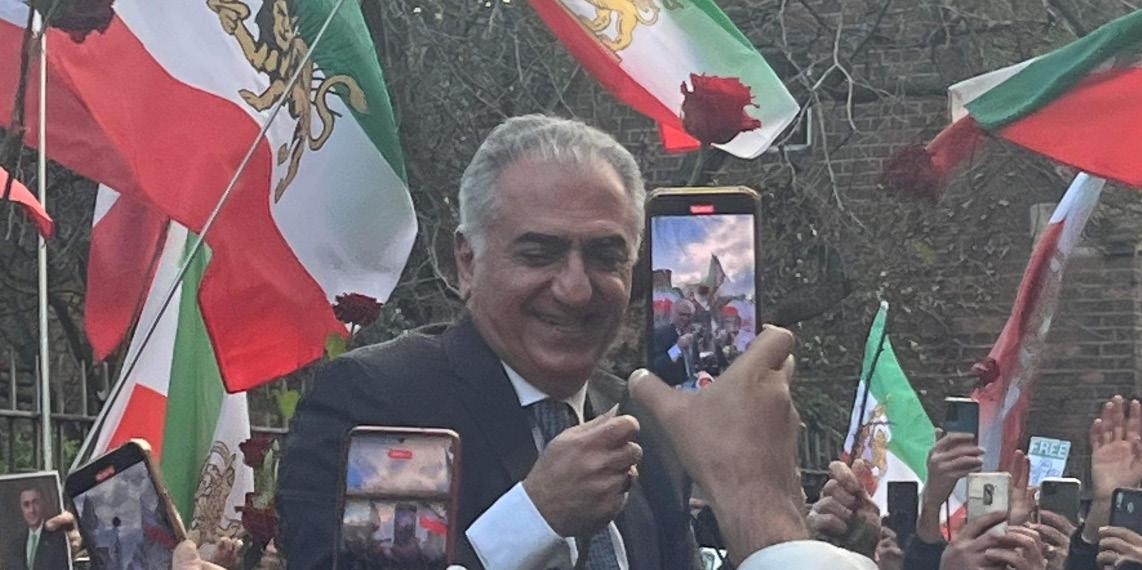
National Council of Iran, an exiled opposition group that is fiercely critical of Iran’s Islamic Republic government. Currently based in Great Falls, Virginia in the United States, Pahlavi remains a prominent figure in the Iranian political landscape, calling for democratic reforms and human rights in his homeland. His past and present actions have brought him both support and controversy, making him a figure of interest to many in the international community.
As the clock struck 3pm, a multitude of demonstrators began to converge on St Michaels Street, clutching the distinctive flags of the former Iranian regime. Amongst the sea of banners and placards, portraits of the Crown Prince were placed prominently, in a powerful display of solidarity. The faces of victims of the current regime were emblazoned on posters, a sobering reminder of the ongoing conflict, serving as a poignant testament to the struggles of the Iranian people.
The demonstration on St Michael’s Street continued to gain momentum well after 4pm, as hundreds more demonstrators poured in, now equipped with microphones to amplify their voices. The air was filled with powerful chants, including “King of Kings”, “The Crown Prince is my representative”, “Britain, Britain please help us”, and “Restoration of the monarchy now”. The powerful messages were conveyed in a chorus of languages, with English, Persian, and Arabic ringing out in unison.
Police began to arrive in large numbers at this point to ensure public safety, as opposed to halting some sort of protest – OxStu spoke to the Bronze Commander on scene who said, “We are here to ensure public safety, we have no fear of how the people here are acting”. Another Police officer told OxStu this wasn’t a protest but a show of solidarity with the Crown Prince.
By 5pm, just before the Crown Prince’s arrival, around 700 people were now outside of the Union buildings. The Crown Prince arrived and waved to the adoring crowd. The Prince’s arrival was greeted with rapturous applause, as supporters swarmed towards him, creating a throng of eager admirers. The situation quickly threatened to become over-
whelming, so the Prince’s security detail and police officers on duty had to work hard to manage the enthusiastic crowd and ensure the Prince’s safe passage into the Union chamber.
OxStu spoke to one of the organisers of the demonstration who said, “We are here to show support for our King, people have come all across the country to see him, people have come from London, Birmingham and Scotland… We want the British government’s help to remove the Islamic republic.
Inside the Union chamber the Crown Prince called for “national justice” and argued that lower ranking officials should be forgiven, and that persecution should focus on those really responsible”. An attendee asked the Crown Prince about “high faith” and whether he buys into it. The Crown Prince responded by saying “secular is a prerequisite to democracy”. The Crown Prince argued that Islamic countries fail because democratic regimes have religious freedom where they can create spaces for religions to flourish and by not accepting those ideals has led to the situation present in many Islamic countries.
Amid heightened security concerns, the Crown Prince was escorted by a formidable entourage of over 100 police
officers and internal security personnel as he prepared to leave the Union buildings. The tight security measures were necessary to ensure the safety of the Prince amidst the excitement of the crowd. The police escort also necessitated the temporary closure of St Michael’s Street, and the convoy caused significant disruption to the local area, with restaurants and pubs on George Street forced to contend with an unusual influx of traffic. Despite the inconvenience, the situation was ultimately handled with professionalism and efficiency, ensuring the Prince’s visit concluded without incident.
Demonstrators showed their thanks to the British Police by chanting “Thank you British Police for helping us see our King” and “Thank you for protecting him and us”.
This recent event at the Union marks the second occasion in recent weeks in which the organisation has found itself at the centre of significant demonstrations, with both supporters and detractors taking to the streets to voice their opinions. This heightened level of attention suggests that the Union has become even more of a focal point for public discourse and debate, with the organisation’s events drawing intense scrutiny and interest from all slides of the political spectrum.
On Sunday night, a vigil was held to commemorate the life of Brianna Ghey, the trans teenager who was stabbed to death in Warrington, at the Radcliffe Camera.
Hundreds of people gathered to pay tribute to the sixteen-year old in an event organised by Elliot CooperBrooke (co-chair of the SU LBGTQ+ Campaign) and Alana Stewart (co-founder of OxACT (Oxford Against Conversion Therapy)). Oxford LGBTQ+ Society asked in a post on their Instagram for people to “join us in creating a space for LGBTQ+ people and allies to come together as a community in the light of this tragedy.”
Speakers shared their memories of Brianna, and read poems and pieces of prose reflecting on her life, and the experience of being trans in general. One speaker said, “we need support from our community now more than ever” and that “trans rights clearly don’t matter in the eyes of the general public.” Another told Brianna that “we will not forget you and we will keep fighting in your name.”
The atmosphere was solemn, with candles being distributed by event organisers and others bringing trans flags, posters, and flowers. A minute of silence was held. Chrissie Chevasutt, the Outreach and Development Worker with Transgender, Intersex and non-binary people at St Columba’s Church Oxford, said that Brianna’s death was because of “gender critical feminists” and the “relentless right-wing media.” She also cited figures who engaged in non-violent protest, like Nelson Mandela and Rosa Parks, as examples to inspire the community’s continued fight for rights.
Two fifteen-year olds have been charged with her murder and are due to appear in court in July.
In a highly anticipated event, the Oxford Union hosted United States Senator Bernie Sanders, who gave a speech and Q&A with Union President Charlie Mackintosh and other Union members.
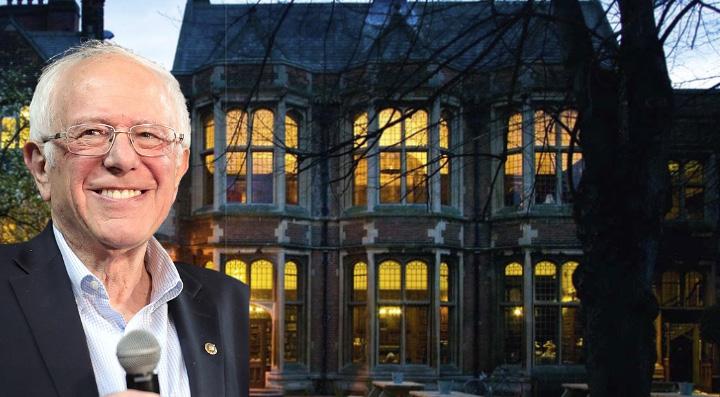
Sanders is a prominent figure in the American left-wing and the progressive movement worldwide. The senator, who currently chairs the Senate Health, Education, Labor, and Pensions Committee, ran twice to be the Democratic nominee for President, despite caucusing with Democrats as an Independent in the Senate.
Since President Biden’s election in 2020, Sanders has been influential in shaping Biden’s economic platform. His appearance at the Union drew a large and enthusiastic crowd of students which included the SU President Michael Akolade-Ayodeji. Students queued for over three hours to see him.
Sanders has been on a whirlwind media tour of the UK promoting his new book It’s OK to be Angry about Capitalism. He has made media appearances on The News Agents, Sky News, and LBC, as well as speaking at an event with Owen Jones at the Oxford Playhouse. Sanders’s brother Jerry Sanders is a former member of Oxfordshire County Council and former health and social care spokesman for the Green Party.
Charlie Mackintosh thanked members for coming out in such large numbers and introduced Sanders as a “self professed democratic socialist”.
In his address, Sanders addressed what he perceived as the erosion of the American working and middle classes alongside the concomitant rise in the prosperity of the ‘top 1%’. At one point, he quoted Franklin Roosevelt in saying that ‘people cannot really be free unless they have basic economic rights’.
Sanders also vociferously asserted that rising inflation was the result of extensive increases in concentration of ownership and corporate greed which made it easier for corporations to engage in price-fixing ‘under the guise of supply chain problems or the war in Ukraine’. He illustrated his point by noting that oil giant ExxonMobil made $200bn in profit in 2022.
The ‘right-wing’ Supreme Court was also criticised. In particular, Sanders addressed the Supreme Court’s 2010 decision in Citizens United, arguing that unrestricted and
untraceable contributions to super PACs (political action committees) were not rights protected by freedom of speech. He also stated that the decision suggests that it is a ‘constitutional right’ to ‘buy democracy’, creating for billionaires ‘the best democracy that money can buy’.
Political media was also targeted, with Sanders arguing that 90% of exposure was dominated by 8 conglomerates that ‘restrict serious debate’. Sanders argued that those groups have created an environment in which ‘politics becomes like a reality TV show… it is not a substantive discussion about the issues facing the American people’.
Mackintosh then asked Sanders what he viewed as the biggest issue in American politics. Sanders responded that the issue ‘overriding’ everything else was climate change, stating that fossil fuel companies had crimi-
An Oxford Ukraine peace rally was held to mark one year of Russia’s “full-scale” invasion.
Hundreds of supporters gathered at the Radcliffe Camera on Friday lunchtime bearing Ukrainian flags and symbols.

The rally began with the Ukrainian national anthem. Oxford University Chancellor Chris Patten’s address was then read out, with the Chancellor reaffirming the university’s commitment to support Ukraine: “Oxford stands with Ukraine.” The founder of the Ukrainian graduate scholar-
ships, Lionel Tarassenko, also spoke. The scholarships provide funding for 18 masters students who are Ukrainians that have been displaced by the war.
The Lord Mayor of Oxford, James Fry, also attended the event. Fry spoke of the council’s decision to sever ties with Oxford previous twin city Perm in Russia. He said that the council’s decision to end ties, rather than suspend them, had been one of their “first actions” after the invasion. The rally was organised by the Oxford University Ukrainian Society. In between speakers, the crowd
nally ‘lied’ about the impacts of fossil fuels on the environment and funded organisations worldwide that propagated climate denial.
In the Q&A session, Sanders implored attendees to build a ‘multigenerational, multiracial political movement that goes beyond the need for incremental change’ and create a ‘government and a society and a planet that works for the many and not the few’. He ended his address by saying that the current generation of students was ‘the most progressive generation in the modern history of this country’, asking attendees to have the ‘courage to stand together and go beyond race and nationality and sexual orientation’ and use ‘extraordinary potential’ to ‘save the planet’.
The evening ended with Mackintosh granting Sanders honorary Union membership, alongside a membership card.
An odd thing about the controversy over the new edited version of Road Dahl by Puffin Books is that it doesn’t seem controversial at all.
Famous authors including Salman Rushdie and Philip Pullman have voiced criticisms against the changes, which have involved expunging the word ‘fat’, increasing (or adding) feminist allusions to independent working women, and deleting racist imagery. French and Dutch publishers have already distanced themselves from the idea of translating such edited work. When even Camilla, the Queen Consort, sees fit to urge writers to ‘remain true to your calling’ despite efforts impeding freedom and imagination, to the cheers of guests at her literary reception, the so-called ‘row’ has apparently passed into the realm of a joke. Judging from some of the ringing language however, one might be forgiven for thinking there was more at stake. There is – but the problem is more nuanced than Rushdie, among others, has presented it.
Rushdie claims that rewriting Roald Dahl is ‘absurd censorship’, of which Puffin Books and the Dahl estate ‘should be ashamed’. ‘Embarrassed’ might be more apt, considering some awkward attempts at preserving rhyme and metre. But to accuse Puffin of censorship is to indulge in misplaced hyperbole. Given last year’s attack and his own experiences of censorship, it is understandable that Rushdie should feel so strongly about editorial revisions. Yet this particular intervention is an unhelpful one which has lent credence and energy to opportunistic, often right-wing agendas.
That Downing Street has intervened with a BFG quotation in a bid to seem relatable, is one red flag. Having condemned the changes, Rishi Sunak rather pompously claims that ‘We have always defended the right
to free speech and expres sion’. The ambiguous ‘we’ is key here, a brazen PR effort to wards lazy solidarity. Although if ‘we’ means the government, one might question its oc casionally arbitrary inter pretation of free speech, where someone might be arrested for an antimonarchist comment, while the likes of Boris Johnson, with a history of offensive remarks and harmful political decisionmaking, is let off the hook. As The Scotsman succinctly puts it, Sunak is the one who should ‘stop gobblefunking around’ when there are more urgent prime ministerial problems to deal with.

Sunak’s statement reflects how it benefits him politically to pick a side, posturing as champion of freedom when popular debate has framed the issue as another battleground in the ‘culture war’. The uproar around rewriting Roald Dahl offers an easy target for accusations of ‘wokeness’ from rightwing commentators – and the sheer glee of newspapers like The Telegraph is palpable. A rush of articles lambast Puffin for its revisions. ‘Roald Dahl is ruined’, cries Michael Deacon, who bemoans ‘our hyper-sensitive age’. Tim Stanley goes further in calling it ‘an assault on liberty by a neurotic elite’. Puffins’s new edition of Roald Dahl may have hurt the liberal cause that it implicitly promotes. This cause is important and risks being undermined: Diverse representation in literature matters, and so does careful handling of language. It is not ‘hyper-sensitive’ to take care that discrimination, whether on the basis of race, gender, or appearance, is discouraged. It is not ‘neurotic’ to wish for a better, freer world which recognises the power of small words, even pronouns. Where Puffin made a mistake was in thinking there was an audience who wished to see
of Dahl, and Philip Pullman was right to suggest his books should be allowed to ‘fade away’ in their own time. ‘Read better writers,’ he added. There are many writers out there with more exciting stories. But sensitivity readers are invaluable if used wisely and, contrary to Brendan O’Neill of The Spectator, they are not censors. At its best, sensitivity reading can encourage empathetic, balanced portrayals which authors may struggle to achieve by themselves. The popular children’s author Robin Stevens is a good example of this, and she has described their vital role in the writing process of her Murder Most Unladylike series, helping her characters ‘to properly connect with readers who share their background’.
Over-use of the term ‘censorship’ can dilute the sense of what real censorship with serious repercussions means, at a time when freedom of expression in Afghanistan, Hong Kong, Iran and elsewhere is being threatened. ‘Policing’ language, making ‘an assault on liberty’: such phrases take on brutal, physical resonances in those contexts. Still, it would be foolish for the West to be com-
placent: last year The American Library Association reported an ‘unprecedented’ number of attempts to ban or restrict books. Many of these had LGBTQ+ themes, or were about race, and this trend of book banning is predicted to increase in 2023.
By contrast, the changes made by Puffin tend to be misguided and ineffec- tive efforts to reverse a rise in bigotry, and to assuage concerns that Roald Dahl himself was prone to problematic prejudices. Examples of Puffin’s ‘censorship’ can be seen in the addition it makes in The Witches, assuring readers ‘there is certainly nothing wrong’ with wearing wigs – a reasonable comment insofar as it addresses the social stigma around hair loss, which often impacts those already suffering from health issues. Meanwhile in Matilda, Puffin replaces Dahl’s allusion to Joseph Conrad and Rudyard Kipling (both controversial for their colonial writings) with Jane Austen, who is often regarded as a feminist author. In a similar spirit of inclusivity, the ‘Cloud-Men’ in James and the Giant Peach have been altered to ‘Cloud-People’. It is
true that such edits can seem trite, anachronistic, and at times overly critical. Nevertheless, the voices condemning such changes should also keep in mind the wider context of censorship, placing the aims of Puffin’s edits in perspective when there are far more insidious examples, with actually dangerous ramifications, happening today.
So yes, there is plenty of censorship going on, but the truly absurd and shameful example is not Puffin’s editorial changes to Roald Dahl – only, funnily enough, that’s the subject upon which the British political establishment and some of its newspapers have preferred to expend all their eloquence. Rewriting Roald Dahl might have been well-intentioned, but the fall-out was certainly not worth the trouble, unfortunately serving as a distraction from deeper conflicts.
Illustration credits:
Yii-Jen Deng
It’s been a blissful few weeks since the name Andrew Tate has graced our screens. If you’ve somehow managed to avoid the avalanche of misogyny and right-wing extremism this social media influencer has spewed out to his legions of fans, then let me catch you up to speed. Tate first started out as a kickboxer, winning several championships before going on to appear in reality TV shows such as Big Brother. From there, his online presence only grew, as he began building a program entitled “Hustler’s University”, which relied heavily on affiliate marketing and has been likened to a pyramid scheme, with its target audience largely comprised of young, impressionable boys.
On December 29th 2022, after a Twitter feud involving Greta Thunberg (a true hero for her role in this, among other things) and a Romanian pizza box, Andrew Tate and his brother Tristan were arrested by authorities and have been in a detention period ever since, with their earliest possible release date looking to be March 29th. The charges against the brothers are serious, with accusations of both human trafficking and rape.
With the arrest occurring two months ago, it might seem like the dust is beginning to settle. Quite the contrary. Tate has whipped up a media storm, with new information arriving every day as the world continues to wonder: how, and why, was he able to amass such a huge social media following, whilst holding such abhorrent views? To answer this, let’s take a look back at the rise of Andrew Tate, and why this wave of misogyny sadly seems only to be part of a larger and never-ending cycle.
The internet proves to be the perfect climate for platforming controversial figures such as Tate, bringing together millions of children looking for content creators to look up to. Since the beginning of YouTube in 2005, creators have constantly taken advantage of young viewers, pulling (and monetising) risky stunts or outright dangerous pranks that leave children
by Tara Earleyawed, but ultimately vulnerable. The “choking challenge”, which involves intentionally trying to cut off one’s oxygen and end up unconscious, might make for good clickbait, but when kids IRL started hopping on the “trend” and losing their lives, the world quickly began to realise the perilous power social media could truly have. These “edgy” channels have been around for years, from PewDiePie in his earlier days to Jake and Logan Paul, the latter of whom received global attention for filming in a Japanese “suicide forest” back in 2017.
It’s not difficult to see why these figures have become so influential for young boys in particular. Under the disguise of giving men confidence and helping them aspire to lives of luxury with fast cars and private pools, subliminal messages promoting toxic masculinity and violence against women begin to slip through, unnoticed. These ideas are not new, nor are they isolated solely within Tate’s fanbase, or just the YouTube space. Such values have been peddled on

way back in 2015, accusing him of sexual assault, which led to his abrupt ousting from Big Brother. This is a clear example of how misogynistic views can quickly spiral from Reddit trolling to real-life abuse with catastrophic impacts that many of Tate’s fans are disturbingly too young to even begin to comprehend.
online forums since their creation, and other forms of media such as video games have faced criticism from time to time for their depictions of bigotry and sexism. The ever-looming Bechdel test serves to show that our favourite films are not as progressive as we might hope. Misogyny and the silencing of women’s voices and lives are nowhere near gone, even in the year 2023.
The effect of these messages on audiences is concerning, to say the least. A recent BBC documentary on Tate deeming him “the most viral man in the world” has explored his rise to fame and the danger of his platform, asserting that his views “represent a new era in modern misogyny”. In the film, reporter Matt Shea spoke to two women, choosing to remain anonymous for safety reasons, who had reported Tate to UK police all the
A podcast episode from The Guardian has discussed some of the effects of online misogyny on children, stating that the “worrying combination” of children watching violent pornography and finding interest in the values of influencers such as Andrew Tate is particularly dangerous for them at such an important stage in their developmental process. Teachers around the world have come forward citing experiences of harassment from young boys challenging their authority or jeering at them to “make me a sandwich”. Didcot’s Ridgeway Education Trust in Oxfordshire has begun implementing lessons on misogyny, in the hopes of halting Tate’s influence and tackling harmful language. Whilst de-platforming Tate is definitely a step in the right direction, it unfortunately will not eliminate the vicious roots of the problem. We can be certain another influencer will step in to fill his shoes any day now, and continue to wield “free speech” as a way of attacking others. Tate is merely a mouthpiece for misogyny’s cause. There is an ever-present hum of hatred that bubbles under the surface of society, and manifests itself in every possible way. In a world where British tabloids are more concerned with tormenting and objectifying women like Britney Spears and Meghan Markle, and where the gender pay gap is still so large that women are working two months of the year for free according to Yahoo, it can feel as if we are moving backwards, rather than forwards. And if we aren’t able to quell the continuous spread of misogynistic ideals efficiently, and prevent the next generation from landing in the alluring traps set by Tate and his replicas that are all too easy to fall into and precariously difficult to climb out of, the road to gender equality itself hangs in the balance.
The mere idea of working for free may sound counter-intuitive to all the assumptions of the market economy in which we live. Everything seems to have been commodified, bought, and sold at a fluctuating price on some marketplace. “It is not from the benevolence of the butcher, the brewer, or the baker that we expect our dinner,” Adam Smith wrote in 1776, “but from their regard to their own interest”. Others may remind us that ‘there is no such a thing as a free lunch’ or that ‘you can’t have something for anything’.
it’s worthwhile if not necessary for us students, in particular, to spend some of our spare time doing something for free, particularly things which aren’t about our career plans or the future, for which we otherwise seem to be constantly encouraged to prepare.
Yet there is an almost unspoken paradox at the heart of liberal societies. That paradox is the fact that the very thing which holds societies together runs counter to all its other individualistic assumptions. Liberal societies rely on what is called ‘the civil society’, which essentially refers to the sum of voluntary organisations, and yes, the individual volunteers that make them. The civil society provides spaces beyond the realm of both the state and the market, provides means to organise against encroachments on liberties, and provides checks and balances on the exercise of power. Liberal societies aren’t only sustained through constitutions and formal structures. They also rely on the goodwill of the public-spirited citizens to run the voluntary associations which make up the civil society. Bluntly put, volunteering matters.
As with any other product or service that is sold to us, volunteering can also be justified on grounds of personal benefit. There are numerous articles you can read about how ‘doing good is good for you’ or how ‘giving back to the community can improve your mental health’. They cite interesting studies about how volunteering can actually improve your physical and mental health and even boost your lifespan. But this is my attempt to argue why
As students, you don’t need reminding of how busy Oxford terms are or how ‘there are only so many hours in the week’. Yet despite the workload (or maybe sometimes because of it), most people try to do other things alongside their studies, and some more than others. Whether it’s sport, music or drama, student politics, or even student journalism (the author obviously doesn’t know anything about the last two) we all turn to something in our spare time. Essays can be written about the micropolitics of student societies, or the minutiae of university life. But what I am trying to argue, in the least preachy way possible, is that we should also make time to volunteer for the sake of some cause, something, anything. We are all encouraged to get involved in extracurricular activities. Yet a few minutes of self-reflection could shock us when realising how much of even what we may do outside the studies, still go back to us, our career plans (or lack thereof), our CVs, or our Linkedin profiles. In the minds of most students, there must be an ongoing inner dialogue about what they’d enjoy and what ‘may be helpful for the future’. For some, there may be an inner struggle between the pursuit of money versus meaning. For a lucky few, the two worlds may even overlap. It may be unfair for all of this to be completely dismissed as cynical careerism or ruthless ambition. Though, needless to say, the kind of personal ambition which turns one into a calculating moral vacuum deserves nothing but contempt. Yet at the same time, it would not be overly catastrophic to say that the labour market that our generation will enter is much more competitive and demanding than the ones our ‘forebears’ entered twenty or even ten years ago. If you listen to most talks by the alumni of this very university about their
“...it’s worthwhile if not necessary for us students, in particular, to spend some of our spare time doing something for free.”
journeys and their successful careers, you might be able to spot a pattern. (And yes, some of them can actually be quite inspiring!). You may detect a common theme: a reassuring tone of ‘Don’t worry! I didn’t know what I wanted to do with my life when I was your age and yet…” and this is the quiet part ‘Look how far I’ve gone!’. Perhaps that is exactly what we would have also said if we ever end up in their shoes. But I want to summon all my ‘powers to persuade’ (of which there must be very modest and meagre amounts) to argue for the importance of pursuing causes through volunteering as well as thinking about and preparing for a career. And whilst we are at it, to reassess the value we place on employable skills over the personal traits which make up our characters.
A favourite story of mine about a historical figure I find quite interesting is one about Clement Attlee when he was Prime Minister shortly after the second world war. It is said that Attlee was once advised by a member of his inner circle to promote some supposedly talented Labour MP to ministerial office. Yet, the then Prime Minister who thought he knew this young MP well, is alleged to have protested with reluctance “It’s not about ability. It’s about character!”.
This brings me to David Brooks’ book ‘The Road to Character’ which I once read years ago. (Yes, I know! I am prepared to face your judgement for confessing to have once read a ‘self-help’ book). The passage I most vividly remember is the distinction Brooks makes between what he calls ‘The résumé virtues’ and ‘The eulogy virtues’. He makes the point, very eloquently, that the kind of traits that we will be remembered for in our lives may not necessarily be the ones for which we are rewarded by employers in the labour market. Indeed, we have an economy that rewards ‘risk-taking’ (sometimes used as a code word for greed and recklessness) rather than kindness and generosity. Yet the so-called eulogy virtues are meant to be the things that make a life well lived — whether you were kind or brave, honest or faithful.
And the most practical way for us to work on our ‘eulogy virtues’, to inject life with more purpose and meaning, and to improve our characters (or ‘souls’) is, in my view, through volunteering. Not for the sake of the CV or employability but for the sake of some cause, and for the sake of others. Whether it’s doing a shift at the Turl Street Homelessness Action or your local food bank (of which there are apparently more branches than there are branches of MacDonald’s, by the way) there is always something to which you can lend a hand or dedicate an hour. By spending some of our time doing things for others, we may end up remembering what life can be and should be about.
Naive as the sentiment may be, whenever I talk to my mum about politics, the conversation usually ends with her saying something to the effect of “I just don’t understand why we all can’t get along.” I have always been brought up with a sense of compassion and sympathy for those different to me, whether it be in terms of class, race, gender, or age. A society where people share a similar sentiment sounds much more desirable to me than the alternative.
Before the recent murder of Brianna Ghey, the discourse around trans issues, especially in light of Scotland’s Gender Recognition Bill, had driven me to despair about the world. One common tactic used by anti-trans “campaigners” is the ‘shock of the new’ as argued by C.N. Lester and other gender theorists, which describes a conscious effort to whip up fear around what seems new and therefore unknown. Discourse, from notorious children’s authors to athletes, has centred around presenting trans people as somehow dangerous to cis gender individuals in certain spaces which have traditionally been segregated by gender. This effort sums up what frustrates me the most about the modern world and in particular the way that media and social media approach so-called “political issues”. More often than not, people attempt to present dangers, which are either entirely fabricated or exaggerated, as the greatest threat to our safety and our way of life. And often these threats play into our emotions and therefore attempt to spark irrationality as a means of winning the argument, if one can stretch as far as to say argument. It is truly depressing to me that it took the death of a young trans girl for this grubby practice to be halted for the time being.

Yet, maybe because it is more logical or because those who have a vested interest in it control the debate, the greatest threats to our society and our way of life are unremarked upon all too often. Straying away from my previous examples, the climate crisis illustrates what I mean effectively. The extinction of the human race and the destruction of our beautiful planet seems a far more pressing issue to me than any fabricated threats which certain individuals try to
present to us.
Studies from the University of Bath’s Centre for Climate Change and Social Transformations, has found that ¾ of UK adults are worried about climate change, with 4.6% suggesting they have suffered climate anxiety as a result. Young people and those suffering from higher generalised anxiety are disproportionately more likely to suffer from climate anxiety. It seems a fairly universal truth among people of my generation that climate change poses an existential threat to humanity. Yet despite all the evidence, dog-whistle articles attempting to make you scared of trans people, immigrants, or Brussels are far more prevalent than those aimed at telling you the truth about the greatest threat mankind has ever known.
My argument speaks to the fundamental flaws with much of the UK media in particular, and global media more broadly. Reality seems a far flung concept to many in this country, from politicians to journalists. It is important that we ask ourselves why these people are so invested in presenting a narrow, biased view of the world and trying to subvert us with their methods of disinformation. The simplest answer is that they have something to gain from doing this; in part because they consider implanting their own political views as far more important than allowing for free, logical, fact-based discourse. Or maybe, their obsessive attempt to make politics all a game which they must win has meant that they would rather divide and conquer than actually do the decent and difficult job of uniting the divisions which history has created. Or, as is most likely in the case of climate change, they simply have material interests to protect and would rather therefore make selfish decisions which furnish that, than for instance attempting to act in a more egalitarian way with a view to the future preservation and happiness of humanity.
One thing which seems to be consistent among most politicians and journalists is a lack of recognition that actions have consequences (if only they had all been brought up by my mum). The leading Brexiteers who spent years leading an arbitrary tirade against Brussels as the vestige of all things evil in the world, now fail to accept the responsi-
bility of how damaging their rhetoric and actions have been to this country. Whether you think Brexit was a good idea or not, I cannot fathom how you could say it has been done effectively or for the supposedly altruistic reasons that the Brexiteers would have had you believe in 2016. Successive politicians have failed to accept responsibility for inaction on climate change, and despite this have wondered why the young have been driven to such desperation as to turn to more direct action to get their points across. Agree or not with the actions of Extinction Rebellion or Just Stop Oil, their protests would not have happened if our Government had listened to reason and scientific evidence for the past two decades, rather than simply ignoring the problem.
I referenced the murder of Brianna Ghey earlier, which has caused great distress among many people in the trans community as well as many allies. Without assigning direct blame to anyone other than the two suspected murderers, our society is riven by a culture of trans-bashing and fear-mongering which many have likened to the antigay “movements” of the 70s and 80s. The normalisation of hatred towards the trans community has produced this culture, and it began with the journalists, politicians, and anyone else who wanted to chip in with a little bit of their own hatred. They do so in the name of what they call “political discourse” or “free speech” to which I respond that no human being’s right to life or safety from violence is a political issue. Anger and hatred should never be the fuels for politics; love and compassion are far better motivators which will help us to create the kind of society that we want to live in. What seems to be a sad reality, is that there is so much to be angry about. But our anger should never be targeted at an individual’s right to life and safety. Like many, I find myself angry at a society where hate crime is far too common, and those responsible for fuelling the ideas which underpin it, are far too often let off the hook. If only our society had collectively learned that lesson which my mum taught me when I was growing up, and if only they would listen to her now.





Simon Jordan is a businessman, former owner of Crystal Palace FC and he currently hosts alongwith Jim White, White and Jordan, which is Talksport’s most popular show. Simon made hismoney from the mobile phone retail business, The Pocket Phone Shop, just as phones were becoming ubiquitous. He owned Crystal Palace, who he has supported since childhood, from 2000 – 2010.
DH: Drawing on your previous experience as the owner of Crystal Palace, what for you are the key ingredients to ensure that as an owner you have a well-run football club?
SJ: There are a variety of key ingredients that an owner must have to ensure that they have a well-run football club. They need to acquire as much knowledge of the club as they can, they need to get people around them who understand the club and they need to immerse themselves in the business. I spoke to Todd Boehly (Chelsea owner) whilst I was out in Qatar and I think that Gary Neville’s criticism of him is ridiculous, because how else can someone like Todd gain an understanding of his business without immersing himself in the club. It’s all about gaining knowledge of the day-today operations of the club and learning from your mistakes. It was easier for me, because I was a lifelong Palace fan. As an owner, you need to be patient and build relationships with the media and the fans. You need to be transparent and communicative.
DH: You invested a lot of your own money in Palace and I know that you had a vision of the club being an established Premier League outfit with a stadium owned by the club and so how do you look back at your ownership experience? Is there some happiness given some of the memories like the 2004 promotion or are there regrets over how your ownership ended?
SJ: It was a very different time (when he owned Palace from 2000-2010), because the best owners used to be the ones you never heard from, now it’s changed. Owning Palace was at the start a labour of love and then it became all about the labour. I tried to build a culture of one for all and all for one. Ultimately, I exposed myself to a lot of risk and it was a case of a fool and his money were lucky enough to get together in the first place. I had to kiss a lot of frogs until Neil Warnock came along. There were a lot of battles for me particularly at the end and the football establishment ganged up against me on many occasions during my time as owner. But there were moments of pride and moments of enjoyment and great moments for my family. I wanted Palace to win and I wanted Palace to reflect my desire to win and to reflect my personality, my will, resilience and substance. For me, owning Palace was all about the club winning on and off the pitch.
Historically, banking and commercial people thought that getting involved in a football club was a great way to lose money (the industry has matured now), but at Palace we developed one of the best academies and we achieved our KPIs in terms of our ticket and merchandise sales and attendances.
Having other people’s money (as a club owner) is often the best kind of money to have and I have little regard for the Palace owners now. They have four-five people doing what I did on my own. There were fleeting moments of enjoyment, but I am not bitter, I want to be better. That’s my mentality.
Today, owners are involved for very different reasons compared to when you had the likes of myself, Steve Gibson and Jack Walker there. Those types of chairmen are few and far between today. The reality is that my focus was on Palace all the
time and I was thinking about how to develop Palace and not Simon Jordan as well. That’s not to say that I should’ve used Palace as a platform for myself, but just that I was completely focused on developing the club at a cost to me.

DH: If you had to be selective, what one reform of English football governance would you like to see?
SJ: For me it’s not just about one reform. I’d like to see proper governance and cost controls. It’s not right that nation states can be in volved as they are, because it leads to hyperinflation in the market. When I was in Qatar I spoke to Nasser Al-Khelaifi (PSG President) about my concerns around nation states getting involved and the issue of inflation and as he said, develop better governance then and that is the right and proper answer. The issue that we have is that whatever Chelsea and Man City do, the effects trickle down. And it may take salary caps and if that’s what’s required in order to ensure cost control, then so be it.
DH: What do you think of some of the proposed reforms of English football, such as fan groups owning a golden share in their clubs and the abolition of parachute payments?
SJ: I don’t have a problem with significant fan input over decisions such as what kit their team should wear or how to build an effective club-fan relationship, but you can’t have them in the boardroom, it doesn’t make commercial sense. There would be significant issues around confidentiality and fans would likely become too emotionally invested in their club and that over-sensitivity would impair their decision-making.
Football should never want a regulator, because greater regulation creates its own issues, but football deserves one. It deserves an independent regulator, because the Premier League is very arrogant about how it operates; it forgets about the important role of the lower leagues. There are a couple of factors to keep in consideration with any reforms, which is that you must balance redistribution from the Premier League with protecting the league’s finances and you must ensure that clubs will be competitive when they get promoted and sustainable when they are relegated.
15-20% of the overall football proceeds generated in our country should be going down into the three divisions below the Premier League and there should be salary caps in those lower divisions. And I disagree with Rick Parry about abolishing parachute payments.
DH: Has English football become over reliant on foreign investment?

SJ: English football is susceptible not over reliant on foreign investment. We do have a tendency though in this country to want to sell everything to everyone else, look at the case of the Harrier Jump jet and the London Stock Exchange.
The Premier League is a unique economic powerhouse. We are in a globalised world and sport and English football shouldn’t be and isn’t immune to that.DH: How have you found the transition from business to football to media? How important is that versatility and breadth of experience for you?
SJ: I didn’t enjoy the media whilst I was at Palace, I thought they were full of hyperbole and nonsense. The news media, especially when it comes to geopolitics and society, often talk nonsense and they have their own agenda.
Scarcity always sells and currently there are no former football club owners who have a me-
dia platform apart from myself. I used to have more money and less influence and now I have less resources, but more influence, because the media has given me a platform. And the media work creates commercial opportunities for me too.
I’m not speaking for clicks or controversy. I’m speaking with insight, experience and substance. I’ve got older and wiser and I don’t want to be deliberately controversial. I want to hold the media’s feet to the fire as well and I know when to speak and when not to. When you’ve actually done something, that helps when you speak about a related issue. Now I say to journalists, when did you own a football club? When did you hire a manager? When did you buy a player? And the answer is never and so they are only repeating what has been said to them.
Also, my finances aren’t determined by my media work, so I can be more independent, be stronger in my opinions and I don’t have to worry about getting cancelled.
DH: With your media work, do you ever see yourself branching out into politics/current affairs?
SJ: Maybe, I can talk about all the theoretical stuff like NHS reform, House of Lords reform. I have immersed myself in other people’s thinking when it comes to those kinds of issues. I offer critical thinking as well as being pragmatic and thinking about the commercial situation.
Look at the situation with Prince Andrew and his out of court settlement. Look at the media stories that are being run about it by Piers Morgan and Dan Wootton, about how he can overturn the settlement. He can’t appeal against an out of court settlement that he freely agreed to.
Full interview available at oxfordstudent.com
“As an owner, you need to be patient and build relationships with the media and the fans.” - Dan Harrison in conversation with Simon JordanDeputy Editor: Matthew Holland Section Editors: Ryan Teo, Samuel King oxstu.profile@gmail.com

George Monbiot is a journalist and writer, most known for his regular column in The Guardian and his various books on environmentalism in which he advocates for an end to intensive meat farming and other initiatives such as rewilding. He received the Orwell Prize for Journalism in 2022 for numerous articles written for The Guardian, including one entitled ‘Capitalism is killing our planet- it’s time to stop buying into our own destruction.
Do you think we have learned any lessons collectively from the Pandemic, if not then

I think there are some lessons, but whether or not we’ve learned them is another matter. So one of them is that for the past 40 years or so we’ve been told that Governments shouldn’t govern. That people don’t want them to govern, and that the Government’s only role is to get out of the way and let this unexamined concept called the market make the crucial political decisions. What happened in the Pandemic is that some Governments, like ours, tried to resist ac- tion for as long as possible, and as a result we had excess deaths and a terrible mishandling of the Pandemic, until eventually they were forced to accept the logic that Governments have to govern.
What we discovered then is that first of all only the Government can introduce the necessary policies and secondly, when we feel that we are genuinely all in it together, then people are prepared to make astonishing changes to their lives.
Now environmentalists like me have always been told that people are not prepared to put up with the changes which we are talking about and are really small changes in comparison to those which we were required to make during the lockdowns. But the great majority of people did put up with that, of course there were some who didn’t and resisted it, but the vast majority just accepted that in these extraordinary times we need extraordinary responses and we have to accept certain restrictions and privations. It’s clear that Governments need to govern, that people want them to govern, and that they need to make these important decisions.
MH: Would you say that the paradigms have shifted so to speak, that we will see this refutation of neoliberalism reflected in an election in the near future?
GM: An election is a very crude means of testing such a proposition, because so many issues are brought into an election and also it’s not like we’re being presented with a clear choice between neoliberalism and something else. I don’t think that is going to give a clear signal of people’s acceptance or otherwise of these ideas.
MH: Why is it that humanity is so prone to misinformation about health, whether it be our own personal health or the planet’s health?
GM: I puzzle over this everyday. I think there is a suspicion of expertise. It was George Bernard Shaw who said “every profession is a conspiracy against the laity” and there is a small amount of truth in that. In many professions, there is a closing of the ranks and a defence of the profession against outside forces. But that’s very weak in science, I mean science is possibly the most open of all professions in terms of its preparedness to be challenged. There is, particularly in the UK, a very strong strand of antiintellectualism. In a way there’s a backhanded compliment in there, with a recognition that knowledge is power.
I also think that fear is a major driver here, that if people
were to accept the fact that, for instance, we have a virus that can kill many people and also disable many, that’s a much more frightening idea to take on than the idea that a bunch of crooked people have whipped it all up to control us. Similarly, this is even more the case with climate change. Accepting what the scientists are saying, that this is moving faster and further than we predicted, is less frightening than saying they’re making it all up. I do think that fear is a very major driver of human behaviour and much of that fear is subliminal.
MH: Are the challenges of greed and selfishness, which are so present in our current society, surmountable or insurmountable?
GM: One of the tenets of neoliberalism is that we’re primarily greedy and selfish; that these are our dominant values and characteristics. But there has actually a very wide range of study in neuroscience and social psy chology which show that while we all have some selfishness and greed in us, for the majority of people those are not our dominant characteristics. Our dominant values are community feeling, family feeling, altruism, empathy, benevolence, but we are constantly told that we are primarily greedy people. Often the people who are telling us that, do tend to be primarily selfish and greedy. Broadly speaking, we are a society of altruists governed by psychopaths. Part of our misapprehension about human nature is that the people we see on the telly all the time are primarily selfish and greedy, and they are continually trying to justify their own traits and portray society as if we are all like them.
MH: Why do you think there is a lack of forward thinking and future planning among the elites of the world?
GM: The great danger is that we hit political cliff edges, because the Government is con-
stantly procrastinating. A classic example of this is what’s going on in the Netherlands at the moment with the nitrate crisis, that governments in the Netherlands were warned since the ‘80s that there was a nitrate crisis and they needed to deal with it. Had they started dealing with it then, they could’ve dealt with it gradually with little political friction or major opposition. Instead they delayed until there was a state council ruling in 2019 saying that nitrate levels breach EU laws and they have to be brought down very sharply. They hit a cliffedge and they had to suddenly do what they should’ve done over decades. As a result, it became politically explosive and then they ran into massive opposition, first from farmers and then from the far right. We’re doing exactly the same climate breakdown, with ecological breakdown, by pushing it on and saying that this is the next Government’s problem. We’re piling up pressure which will eventually be felt in a direct conflict between whatever Government is unlucky enough to be standing without a chair when the music stops.
In principle, in the UK we have a plan that commits us to the long view, which is the 2008 Climate Change Act, saying that you have scaled down greenhouse gas emissions by x amount every year and that every Government has a responsibility to do that. What we have actually done is to deal with the easy stuff first, primarily electricity generation which is really politically easy because no one thinks much about electricity. Everything else is politically difficult, when it comes to transport issues or heating your home or the food you eat; all of these require that people are engaged in that decision making and that they themselves have to make choices. One of the very few Governments to have this forward planning is the Welsh Government, with its Wellbeing and Future Generations Act, brought in by Jane Davidson
and now being actually applied, which is one reason why they’ve abandoned all new road building projects in Wales.
MH: You have written extensively about how our habits of consumption are causing climate breakdown. Is there a possible way that we can, at least from a Western perspective, mould our habits to be more sustainable?

GM: I would slightly reframe the question to talk about Earth systems rather than just climate change, because there is a danger that we just talk about climate without recognising that this is one component of the environmental crisis. It’s quite right that we should be putting a lot of energy into changing our impacts on the climate, but sometimes if we focus on that at the exclusion of everything else it could have perverse impacts on other Earth systems. The only way we are going to get through this century is a radical change to our engagement with these Earth systems. Firstly, we need to stop seeing ourselves as consumers and recognise that we’re most powerful and effective as citizens, despite the fact that we’ve been told relentlessly that we’re consumers. It’s interesting how our language is constantly trying to atomise us, for instance when we talk nowadays about “individuals” rather than referring to people. Then there’s also this term “personal”, and some people can’t finish a sentence without referring to something “personally”. What we’re reflecting, is a cultural hegemony. What is being encouraged all the time is that we could be better consumers. These changes make marginal differences if they make any difference at all.
Full interview available at oxfordstudent.com


















Following the Oxford SU Leadership Elections, we are running a by-election to fill three vacant positions as NUS Delegates. From the three positions up for election, at least two of them must be self-defining women.
Find out more!

Room bookings are now available on our website and, don't forget, you can use the communal space without booking!

Keep an eye out for events in the space in the coming weeks. We can't wait to see you soon!

Despite being a small island only 245 miles long and 89 miles wide, Taiwan’s geography is remarkably impressive. The island was formed millions of years ago at the boundary between the Eurasian Plate and Philippine Sea Plate and most of the eastern side is therefore covered in enormous mountains that appear to ascend straight from the ocean.
These mountains are smothered in green forest, the dangers of the ragged rock beneath hidden by rolling trees. In stark contrast, to the west of the island lie expansive flat plains, leading towards large cities, industrial sites, and beautiful beaches.
Bridging a still-active tectonic boundary, the island is also prone to serious earthquakes, and the population still mourns the tragic events of 1999 when over two thousand people were killed by a 7.3 magnitude shock. As I learnt last autumn, typhoons are also common, and, on rare occasions, the government requires everyone to stay home for a day or two.
I was never a massive fan of geography in school and enjoyed people making fun of it for just being glorified colouring in, but living on an
island where geography is so important might just have converted me.
I particularly felt this last week, when me and my flatmates were invited to climb a mountain with a hiking group comprising mainly of Taiwanese much older than us. Hiking is a popular pastime in Taiwan, including amongst the elderly population who often put a huge emphasis on staying fit and healthy through exercise. As to our own levels of fitnessthey were just about to be tested.
The challenge we were attempting to tackle was the easterly peak of Snow Mountain, the second highest mountain in Taiwan and over 3,000m high. The name might deceive you into thinking that this was some great icy adventure, but, in reality, the mountain only receives a little snowfall for a few weeks a year. On an island that mostly never sees the snow, clearly even this was deemed significant by the people who named it.
Our itinerary included an overnight stay in a hikers’ cabin halfway up the climb. The cabin, like many others of its kind, is run mainly by indigenous people, whose

families have lived in these mountains for centuries, if not millennia.
Nowadays, Taiwan is home to over sixteen distinct indigenous communities, and discussions as to how to respect and appreciate their histories are increasingly gaining traction.

So, on Monday morning, after an adventurous night’s sleep and a 5am wakeup that went against all my circadian rhythms, we set off for the peak. We reached the top before midday and were duly rewarded with a magnificent view. From our height, we could see hundreds of mountains rising from a sea of suspended clouds, with a few rocky peaks emerging from an endless, thick green throb.
As I reach over two-thirds of the way through my time in Taiwan, the hike gave me the chance to see a part of the island that it is easy to forget about amongst the daily hustle and bustle of Taipei. Yet, it is also a beautiful part of the island that is home to Taiwan’s oldest cultures and histories, and one that I hope I get the chance to explore more.
“I was never a massive fan of geography in school and enjoyed people making fun of it for just being glorified colouring in, but living on an island where geography is so important might just have converted me.”
I spent a significant amount of my last few weeks in Paris with a black eye - sustained accidentally during a light-hearted scrap on Burns Night when my friend’s knee reflex unfortunately collided with my face. I woke up hungover the next day, looked in the mirror and remembered the regrettable events of the night before. The worst part wasn’t so much the pain of the black eye but the week that followed of explaining, odd looks, and people clearly staring directly at the non-black eye to make it ‘not a big deal’. My mother asked me on Facetime whether I had ‘got in with the wrong crowd’, and refused to believe my version of events whereas my fellow interns told me I looked like a true weathered Parisian. I appreciated their concern and was very relieved when the bruise faded to what I could successfully claim was just the dark circles of working a gruelling 9 to 5.
The black eye also miraculously cleared up before I went to visit some family friends who live in a tiny town in the Paris suburbs - with this being my third visit to their home I was fairly well-versed in what to expect. I was invited round to celebrate ‘La Chandeleur’ - a French tradition unknown to me and apparently called ‘Candlemas’ in English. I quickly discovered that it is just essentially Pancake Day and I spent the afternoon eating crepes. A unique part
of these visits is that I am really forced to leave my anglophone bubble and come to terms with the level (and more often deficiencies) of my French. Surrounded by some authentic Frenchmen and women, I’ve found that the phrases they teach you in Year 7 French to answer questions like ‘What do you want to do when you’re older?’, are genuinely quite helpful - who knew!
To continue with the authentic French experience my friends and I paid a visit to the (apparently) famed ‘Le Caveau de la Huchette’, a live jazz venue which was featured in La La Land (which is all it took to convince me to go.) The best words to describe it would be compact and immersive - quite literally. As I ventured down into the basement to see the live band, a random and highly skilled man asked if I wanted to dance with him (jazz-style and very much out of my dancing comfort zone.) Of course I said yes, because why not? I did go there seeking the authentic jazz experience and I spent much of the evening being literally spun around on the dancefloor.
I was recently asked what have been my Paris highlights - on reflection, at the top of that list would be the visits from Oxford friends who made the trip across the pond (largely to make the most of the free accommodation in Paris). Those visits have been some of my best times in
Paris - largely because showing them around has forced me to be a tourist again and appreciate the sights. Although seeing the Eiffel Tower sparkle for literally the 100th time has slowly lost its initial wonder.
I’ve now left Paris and it really feels like the end of an era - I know I’ll look back on the last six months as some of the most fun, challenging and valuable times. The internship itself was questionable but the other interns made the days in the office actually enjoyable.

I’m not ashamed to say that I did shed a tear in Gare du Nord waiting for my Eurostar back to London (the Parisian equivalent of Kings Cross and probably not somewhere you would want to be seen crying.) Laden with bags and wearing practically all of my clothes to save suitcase space, I spent much of that time on the train remembering my initial journey over to Paris in September, scared shitless to put it simply - and I left Paris very much not wanting to leave! Bittersweet is probably the best way to describe it - although I know I’ll be back to visit my friends there, uprooting onceagain and having to start all over again in a new city is daunting. Onto the next I guess - see you shortly Rome…

“Laden with bags and wearing practically all of my clothes to save suitcase space, I spent much of that time on the train remembering my initial journey over to Paris in September, scared shitless to put it simply - and I left Paris very much not wanting to leave!”

After Warsaw came Krakow, the chief representative of the paradox of Old Towns that I spoke about last time. The best part of Krakow is categorically not the streets around the Market Square and pretty epic two-spired cathedral, but rather an adjacent area called Kazimierz. Formerly the Jewish quarter pre-1939, it now abounds with nice restaurants and bars, cheaper and of better quality than those in the centre, and the furious zapiekanka (Polish pizza-like street food) scene of Plac Nowy is the focal point of the district. What’s more, its cultural history is still sensitively preserved down the road on Szeroka, where the Jewish bookshops and synagogues that were the heart of the pre-war community have been re-established and commemorate its tragic past.
The rest of Krakow is still good, although don’t go church-hopping on a Saturday afternoon unless you’re socially comfortable with crashing several weddings. Of course, I am. The altarpiece of Corpus Christi Basilica was worth the glares. No regrets. I then went down to the Tatras mountains, to a town named Zakopane. On the train there I got two storm warning texts, but still had to make the journey to my hostel in the pouring rain. I had to cave and get a taxi, secured using a primitive Russian-PolishEnglish pidgin, because I was not walking 40 minutes uphill in a lightning storm. The rain was so heavy that I felt it had sentience. Malicious sentience at that.
The next morning, I set off to

do a hike to a mountain lake with some buddies from the Goodbye Lenin Hostel™. A bus took us to the foot of the trail, literally a stone’s throw over a small stream from Slovakia. The 10km uphill hike was enjoyable, and the scenery predictably gorgeous, although the wastemen who paid to be taken up in a pitifully anachronistic horse-drawn carriage came between me and total happiness. The lake itself, Morskie Oko (Eye of the Sea), lived up to its appellation. A dew drop of crystal clear water nestled in the delicate fold between several stunning peaks. The water was the most perfect shade of turquoise imaginable. I won’t attempt poetic description any further, just look at the photo of me doing my best Wanderer in a Sea of Mist impression.

So yeah, that was dope. Next up was Wroclaw, which is pronounced nothing like it’s spelled (/vrotswaf/). This student-dominated city on the banks of the Oder defied all of my expectations. My main reason for going was its convenient location midway between Krakow and Prague. I’m more than happy that I decided to make that stop. Wroclaw has the awesome architecture of Krakow and Warsaw, but as a city it’s far less chaotic and tourism-orientated. The Old Town is a delight but the real highlight is Ostrow Tumski (Cathedral Island). As you approach along the banks of the river, the cathedral’s spires are perfectly reflected in the water and a feeling of peace reigns. I’ve never enjoyed being somewhere as much as I did

in Wroclaw. Every turn I took, every building and church I looked at, every glass of vodka a strange man named Pawel bought me in a bar under a railway arch, it was all perfect.

I was sad to leave this hidden gem of Central Europe so soon, but I had to get to Prague. This is where the title finally comes in. On a 5 hour bus into Czechia I glimpsed a magical town out the window. A handful of towers, a hilltop fort, pristine in the summer sunlight, it was joyously unexpected. I reached for my phone to find the place’s name: Klodzko. It has the nickname Mala Praha (Little Prague), and I could see why. I vowed to return, and then went back to screenwatching Flixbus’ most desperate man. This dude spent a 5 hour coach journey chatting up scores of women, on phone and computer, over Instagram, Whatsapp, Snapchat and Tinder, in at least three different languages. Kinda impressive, deeply concerning. He knew I was watching him, but when you’re that shameless you can’t really object.
In order to break free from the funk of working in Oxford and working at home, I dipped to Poland again this January. I flew into Wroclaw on a dirtcheap Ryanair flight with a backpack and the intention of coming good on my vow. Wroclaw was far emptier than it had been in summer, but the city was just as amazing as I had remembered. It firmly holds the accolade of Jonah’s favourite city in the world. I strolled around the city again, loved it all again, and then
came time for the Klodzko mission.
I was determined to experience the town in sunlight, so a thorough examination of the weather forecast induced me to book a 7:30am train down there in order to dodge the afternoon rain. I left my hostel and my sole roommate Jan, a curious man who thought it was OK to eat smelly meat and pickles in the dorm (it wasn’t), at dawn to tram down to the main station. Walking down the Oder towards Ostrow Tumski in the morning light, the view was transcendental (see photo). I was gassed to get to Klodzko.
The view from the station platform set the tone. I first came to the St John Bridge, a short foot crossing over the river Nysa from the lower part of town to the upper. The colourful façade of the upper bank towered over my position on the lower, I found it reminiscent of the skewed cityscape of Les Triplettes de Belleville. Statues dotted the sides of the bridge itself in imitation of the Charles Bridge in Prague. Progressing uphill to the Town Hall and later fort, I had the place entirely to myself.
From a vantage point on one of the fort’s battlements, I gazed over the picturesque little town and beyond. The Gothic tower of the Town Hall dominated the skyline, but the green expanse of the Silesian Lowlands stole the show under the morning sun, gently penetrating through textured, wispy cloud. Sitting on a picnic bench at the edge of a fort of which
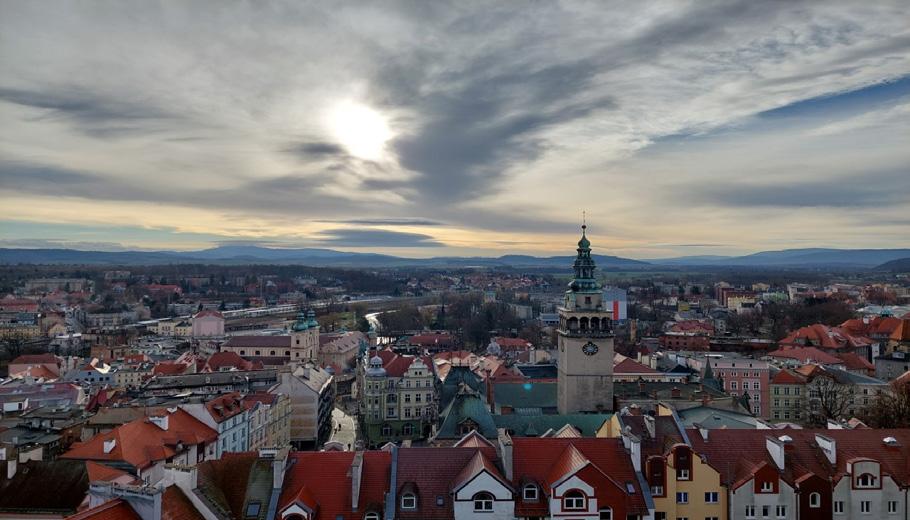
I was sole visitor, buffeted by the cold wind, looking over a town I had made a vow to visit, the circle was complete. It was pleasing indeed.
I still had time before my train back to Wroclaw, so went over to the other side of town, where there was allegedly another(!) fort. A sinister-looking, dead-straight track led up to some mental-asylum-style gates through a dark forest. As I made my way towards them, I noticed assorted debris in the undergrowth, the source of which I cared not to speculate on. The fort itself was overgrown and derelict, and I began to hear strange noises. I decided it probably wasn’t deep. There was a nice promontory that stared across the river valley to the town on the other side, replete with some log-seats, a fireplace, and more debris. From there I took in another beautiful perspective of Klodzko’s spires and brave fort, then made my escape.
Isn’t it nice when things come full circle like that? I think it is. Anyway, that’s it for this term, hopefully I’ll bless you with further badly-written ramblings in Trinity. In a bit.
This week’s search for a busker led me to remember that we go to a university with a immensely diverse group of people with so many different experiences! I had once again somehow missed out on hanging out with the buskers in Oxford, with the large crowds diminishing as the weather became increasingly freezing. When wondering how to solve the issue of, you know, running into someone to write about (If the man who has the machine that turns on Cornmarket reads this: I am sorry I couldn’t find you to follow up, I really want to interview you!), I realized that there had to be some student buskers around Oxford. My search quickly ended when I asked my friends if they knew anyone who busked at Oxford: turns out my good friend Binti busks back home in Germany! My column was saved.
Binti had started busking in 2019, but on a much more casual frequency compared to the normal frequenters of the scene here at Oxford; she’d go occasionally, mostly during the warmer months. It truly took a lot of dedication to even brave weather, hot or cool, and perform outside; something I always admired about buskers was their willingness to sing or play instruments (or be interviewed for half an hour by a random fresher about said singing and instrument playing) even in the middle of winter. Still, Binti had done what many other student musicians never got to: she got out and performed in front of other people. “I was practicing in my room either way… i might as well do it in the city and get money for it,” she noted. Binti had always been a musician and music lover rather than just a busker–she always knew the best acoustic covers of songs when we hung out and we had eagerly waited for the day that our Tiktok-discovered obscure songs finally came out on Spotify. And it ran in her family–both her parents busked as well! Something that Binti enjoyed that no one I interviewed had mentioned before was people watching: being a busker allows you to people-watch a lot. As another city girl, i saw where she was coming from! It’s always nice being able to see new people as they pass by and imagine their lives, especially kids. Binti noted that she always loved how kids reacted to her playing, and
having parents give their kids money to give her rather than just the normal toss of coins into her case. It’s so cute having kids watch the buskers, so it’s lovely to know that it benefits all parties involved. She did note that busking wasn’t all fun and games– there could be creepy people. But there were ways to busk safely and avoid weird interactions without losing the whimsy of playing.
I had always known that she wrote music, but now my curiosity had truly peaked: did she ever play her originals when busking? How did the people of Bremen react as compared to Oxford’s more-than-positive reactions to our buskers’ originals? Binti tells us that it’s actually the opposite: she stuck to covers because people recognized songs more (and tend to give more money as well) compared to the lack of recognition that came with originals. It was certainly interesting to think about the differences: I am normally a big fan of originals when busking, though I did enjoy a Jordan-like cover session where you could sing along as well. Perhaps it WAS the idea of audience engagement and validation that truly mattered both here and there, but with very different ways to get there.

So the big question: would she busk in Oxford over the next three years?
Binti didn’t close the door to it (Good, because I truly do love to hear her performing, whether over video in our group chat or when casually singing along to whatever’s on aux), but she didn’t really want it, citing the fact that you’d know everyone who’d watch you play. The tight-knit community of Oxford made it very easy to be known as a busker–think about the buskers that you, dear reader, know of and are probably mad at me for not interviewing. Like it or not, busking makes you well-known, which can be scary no matter how many times you’ve done it before. Yet that is what it does–busking pushes you out of your comfort zone and helps you gain confidence. It is not unlike Oxford in regards to its ability to make people grow and become better people that aren’t afraid to chase after what they want, no matter how scary it is at first.
Read more on our website: theoxfordstudent.com
Once hailed as the saviour of the fashion industry during the pandemic, where no in-person fashion shows and brand launches were taking place, digital fashion has fallen by the wayside over the past year.
The premise behind digital fashion is relatively simple - you submit a picture of yourself, choose a digital outfit, and then someone edits the outfit onto you.
What sounds on paper like every influencer’s dream is, unsurprisingly, a bit too good to be true.

Thankfully, most digital fashion brands give you an idea of what your final photo will look like by placing a mock-up of the outfit onto you in a way that’s similar to a filter on Snapchat, but ultimately, the users have to place a lot of faith in the people who actually edit the photos. Effectively, you have to hope the person editing your photo has the same vision as you for the final product.
Of course, the unavoidable fact of digital fashion is that its digital-ness is always noticeable.
Sometimes, the evident editing is good - where else would you have the chance to ‘wear’ fantastical sci-fi outfits that defy gravity and otherwise don’t exist?
However, despite advancements in computer-generated graphics over the last 20 years or so, digital fashion photos tend to have an uncanny quality to them that draws attention out of more of a morbid curiosity than genuine adoration. This is evident in many Instagram comment sections, where some followers are more confused by the ‘clothes’ than amazed by them.
Digital fashion brand DressX, who have recently branched out into NFTs and metaverse avatar creation too, offer the typical digital fashion service of having ‘clothes’ available to buy, and an editing service to digitally dress you up in them. Browsing through their catalogue, you can buy a hat or a t-shirt for
$15-$20, but most of the articles of clothing promoted by the site range from $75-$110. The most expensive thing I could find was the ‘Intergalactic Freedom Dress’ at a whopping $1,500.
The biggest benefit of digital fashion has always been its eco-friendly status. There are no fast fashion sweatshops involved because you aren’t buying a physical product, instead you’re buying into a very niche piece of art; an NFT that’s slightly more useful than all the rest of them.
As someone who spends hours browsing for clothes online, I know what I expect when I buy something - the money leaves my account, I wait a few days, and then I feel the rush of excitement when I unbox whatever I’ve bought and (most importantly) I get the feeling of confidence and excitement when I get to wear the thing I’ve bought.
The core problem here is the massive sensory disconnect between real clothes and digital ‘clothes’. Clothes can be so empowering (I’m sure you’ve heard the cliché about looking great and feeling great too!), and the fact that the digital clothes never touch your body denies you any confidence you may have had if you could wear them in real life. Digital clothes then are almost a hollow façade of what clothing really is.
100% digital fashion would be a great idea if we lived 100% digital lives, but, in an era where fashionlovers are trying to be as thrifty as possible, and bring down the costper-wear of every item they own through repeated use, clothes you can only ‘wear’ for a photoshoot or two just don’t cut it.

I almost didn’t apply to study PPE because I wasn’t sure about studying philosophy. It seemed so pointless – why would I waste my time with something as impractical as philosophy? What I really wanted to study was politics and economicstwo subjects through which I would be able to understand the world, so I thought. Nevertheless, the thought of being a PPEist, at the University of Oxford was much too tempting for me, so I applied regardless.
When I arrived at university it turned out that economics was the subject which I didn’t enjoy. I had loved it at A-Level, but could not say the same about how I found it now. Gone were the diagrams and discussion, and in its place came differentiation and utility functions. I discovered that economics is far more mathematical than I had realised. Now, I look back and realise that I was never really interested in the mathematical analysis that

actually underpins economics, I actually wanted to learn about the interesting ways that people interact. My love of economics was grown and cultivated by Freakonomics – but I now realise that the economics that I thought that I enjoyed was actually economics through the eyes of a journalist, who takes the research and presents it in a way that the average person can appreciate. Now I realise that I want to be the average person, or perhaps even the journalist – but certainly not the economist.
Despite this realisation, I remained persistent that I would study economics. A large part of the reason why I thought that I would stick with economics, and why I think many people stick with it is the idea of utility. Economics is seen as more of a ‘serious’ subject than politics and philosophy, a subject which gives you the skills that you would need to get a job – which often seems like the
main reason why people are at university. This meant that dropping economics felt like a conscious decision to reduce my employability. I have never wanted to subscribe to this idea – I want to actually enjoy my degree and study things that I am interested in. Being in a position where this is even an opportunity is a great privilege – many people often feel pressure from those around them to study whatever has the highest earning potential, rather than being able to study what they love. (I do feel obliged to note that I am still going to graduate with an Oxford PPE degree - it would be facetious, and frankly incorrect, to pretend that my degree is unemployable because I am not taking more economics papers).
Wanting to enjoy my degree is why I ended up dropping economics in the end. Over the course of my first year, I realised that philosophy was actually quite interesting ,
and that I might want to keep studying it alongside politics and economics – the rare tripartite combination. This remained the plan until one fateful Monday evening in Trinity Term. I had procrastinated my problem sheet until the night before it was due in, and was once again attempting to do it all that very night. As I sat in my chair, desperately not wanting to do the problem sheet, I came to a realisation – I don’t enjoy this. Having to do economics was actually just making me sad. As a great Nigerian poet once said, ‘I can’t come and kill myself’. Why should I put myself through so much misery for economics? For economics?
Now, almost two terms since the decision to drop economics, I’ve realised that it was actually one of the better decisions I’ve made in a while. Although two essays a week is a bit of a grind, not doing economics is definitely worth it. Occasionally I see some of my
economist friends doing economics work and pity them, thankful that I will never have to know what a Lagrangian is. (side note - please look out for your second year economist friends - the economics life is not an easy one). This decision to drop economics was also paired with the decision to do philosophy, which is also one that I am proud of - philosophy is great fun and appeals to my tendency to ask ‘why’, in a manner not too dissimilar from a toddler.
I would like to conclude by being balanced on economics. I (obviously) think that studying philosophy and politics, and stoking your curiosity and gaining a deeper understanding of the world is a great thing to do – but I’m sure that there are also great uses for economics. Probably.
In Past Lives, Korean-Canadian playwright Celine Song has crafted one of the most achingly romantic, melancholic and beautiful films of the 21st century. It is an honest, elegant and restrained depiction of yearning, nostalgia and restraint, brought to life with such originality and authenticity that it instantly became the highlight of this year’s Berlin Film Festival, even if it did not receive the accolades it so richly deserves.
The film follows Hae Sung (Teo Yoo) and Nora (Greta Lee), childhood sweethearts that were separated when Nora immigrated to Canada from Korea at the age of 12. The two would go on to lead vastly different lives, with Hae Sung following a seemingly predestined path of university, military service and a white-collar job, while Nora, unshackled from the confines of a traditional Korean worldview, pursues a career in playwriting in New York. Out of providence, or In Yun in Korean, the two reconnects with each other in 12-year intervals as the film follows their encounters and their attempts to kindle and rekindle their relationship, from their early teens, to their twenties, and finally, to their mid-thirties, when Hae Sung decides to pay a fateful visit to Nora in New York, who is now married to Arthur (John Magano), a white, American writer that represents Nora’s new, present life.
Past Lives comes to life in both its spoken and unspoken moments. The screenplay is magnificent, translated movingly by its two leading performances from Greta Lee and Teo Yoo. In particular, Greta Lee inhabits her character with such ease and lightness that when she finally reveals Nora’s sorrow and poignancy from years of longing, nostalgia and separation, the contrast makes her performance shine even brighter. Equally natural is John Magano as Arthur. Magano manages to retain such likeability as the trespasser in the central relationship, showing humility and compassion behind an initial appearance of awkward bewilderment and envy. This is augmented by Song’s clever
blocking and framing of the characters, made especially evident in a crucial scene that bookends the film featuring the three characters in a bar, engaging in a conversation that cannot be genuinely conversed.
Celine Song’s broadway experience is immediately obvious in the best way possible, as the film is so tightly written that no detail is insignificant. Her dialogues often feel poetic, but in a way that is literary without ever becoming forced or unnatural. There are elements of Sofia Coppola, of Nora Ephron, of Wong Kar Wai, of Richard Linklater and many other cinematic masters in Song’s writing, but it always feels so original, palpable, transporting and coherent, moving like a creeping crescendo of emotions, enrapturing us from the very first scene all the way to its stirring, heartendering and tearful ending.
What’s so striking about the film is that the sense of distance is most pervasive in the moments where Nora and Hae Sung are physically next to each other. Here we have two star crossed lovers, reunited after years of separation and longing, unable to articulate their feelings, their desires, their loss and their regrets. Instead, all of this is conveyed with such richness through Song’s adept use of the unspoken, the pause, the silence, the gentle exchange of eye contact, all building on each other to create first, an overwhelming passion followed by poignant melancholy. It is a masterful demonstration of how, being pushed and pulled all across the world, we often find ourselves strangers among our own people, faced with our own upbringing, memories and culture, confronting our most intimate relationships. Sometimes, there is no lonelier feeling.
Few films have been able to portray the immigrant experience with such nuance and authenticity. Leaving home, finding new meaning and purpose in a new environment, straddling between two worlds and learning to accept a multicultural identity. We begin to question our understanding of our roots and our sense of self.
Fitting into a new reality and value system is hard. Letting go of our past is even harder. This is, in essence, the central dilemma for Nora - Hae Sung is a recurring reminder of her past, of Korea, of a world she has left behind. There is comfort in clinging on to the beautiful, unresolved memories of yesteryears. The struggle is to reconcile that with the insurmountable necessity of living in the present and moving forward.
At its heart, Past Lives is about fate. It is a deeply romantic look at how our understanding of love changes with the passage of time, how maturity can shatter memories, dreams and perceptions, and how the paths we have chosen reinforce or eliminate our most fervent desires, all told through a love story that spans decades, continents, and realities. Song’s look at past lives, not only at the past we have experienced, but also at the multiple past lives that we could have and would have lived, strikes a profoundly philosophical chord that leaves viewers pondering their own paths, their own love and loss, their own ‘what ifs’, their own past lives. It is a small, intimate story communicated with the deepest emotions and the biggest heart, a touching achievement representing not only the Berlinale at its best, but also an enchanting, loving example of modern cinema at its best.
Le Grand Chariot is a film about puppets, not people. Detailing the diverging paths and deeply convoluted love lives of a failing puppet theatre troupe in the guignol tradition, Le Grand Chariot tries its best to be heartfelt, but ultimately proves to be a nothing film.
Chief among its faults is that its characters are simply not likable. As relationships grow ancollapse, as ambitions are fulfilled or abandoned, we find neither a novel perspective on these experiences nor a particularly exceptional portrayal of pre-existing perspective. This is particularly disappointing given the potential of the plot. For instance, the film features a central love quadrangle (a characteristic
trope of Garrel), in which the puppeteering troupe’s outside hire Pieter (Damien Mongin) cheats on his pregnant wife Helene (Mathilde Weil) with Laura (Asma Messaoudene). Soon after Helene divorces Pieter, Louis (Louis Garrel), eldest son of the troupe and best friend of Pieter, quickly swoops in to replace him.
Throughout this dramatic setup, Garrel manages to make almost every character irritating. We are given no reason for Pieter’s infidelity, no foreshadowing of Louis’ relationship with his best friend’s ex-wife, and no sign that Helene was particularly devastated by Pieter’s betrayal. Meanwhile, Laura seems to exist only in relation to Pieter, as her own ambitions, story, and sensitivities are never explored. Throughout each of these relationships, we get the feeling that none of them particularly like each other. This is entirely understandable, as the audience won’t particularly like any of them either. Pieter constantly asks for money from his best friend, Helene and Louis’ relationship is never questioned, and Laura is only the most likable of the bunch because we learn so little about her.
While the father () and the grandmother () are less offensive, they are just so completely boring. These characters’ reactions, or their actors’ performances, are so muted that most of us simply cannot understand nor sympathize with them. Frequent silence and long takes are rarely justified, as Garrel and his actors make no effort to add tension or intrigue to what little is taking place on screen. Instead, Garrel too often burdens the audience with the responsibility of extrapolating from context what characters are feeling, making so few artistic choices that we see less emotion throughout the entire film than from people-watching in a cafe.
The film’s meager exploration of its themes further dehumanizes its characters. After the father and leader of the puppeteering troupe passes away, his successors are met with a dilemma: do they continue their father’s artistic
legacy, or pursue their own passions? Yet neither choice is presented convincingly. Garrel lazily explains in voiceover that Louis likes painting and Pieter wants to act, then never explores or justifies the beauty of these professions. Rather than connecting these ambitions to the characters’ lives, they remain abstract macguffins. Likewise, Garrel tells us that the older generations care deeply about puppeteering, but doesn’t show us why we should care. For the vast majority of audiences who haven’t even done a cursory search of guignol on Wikipedia (as I had to do), the failure of the puppeteering troupe elicits only a mild sympathy for the characters that is so tempered by their utter unlikability as to be negligible.
None of Garrel’s characters feel like real people. With characters absent any compassion or passion, Garrel relies primarily on context to elicit emotion from the audience. For this reason, his characters may go through all the motions that humans do, but feel more like puppets on the big screen. Throughout the film, we find ourselves asking one persistent question: who cares? Who cares if guignol puppeteering dies out? Who cares if Pieter fails as a painter or Louis succeeds as an actor? Who cares if the father suffers a heart attack and the grandmother develops Alzheimer’s? Who cares about any of these things, because it is far too palpable that they have not happened to real people, just characters.
Admittedly, some critics have praised the film. Most notably, Jordan Mintzer of the Hollywood Reporter described it as ‘intimately familiar.’ Yet this thing he purports to feel is entirely dependent on a familiarity with French Auteurism or director Phillipe Garrel’s previous work. This is Le Grand Chariot’s original sin–for a film about a relatively ordinary family’s relatively universal experiences, it is baffling and frankly offensive that Garrel would establish such a high barrier to entry to whatever contribution he makes to our artistic understanding of the human experience.
On a chilly Wednesday evening in February, I ventured out of the warmth of my room to the Oxford Playhouse for the opening night of An American in Paris. I must admit, it had been a long day working on my dissertation, and all I really wanted to do was go to sleep. I was slightly anxious that two hours in a warm, darkened room would send me right off, but as soon as the live band struck up, I was wide awake.
There were many stars to 00 Productions’ An American in Paris, but for me the star of the show would have to be Molly Jones in the role of Jerry. A woman playing Jerry, albeit not changing the character’s gender, was a welcome surprise. I do slightly wish they’d fully gone for a bisexual American in Paris, but at the very least, it was certainly queer-coded, as, of course, is the character of Henri (George Vyvyan). But beyond any question of queer-coding, Molly Jones was simply the perfect choice for Jerry; it was absolutely clear why she was cast. Flirty, witty, and charmingly irresistible, she almost made you wish you were being twirled around the banks of the Seine like Lise.
Speaking of Lise, Rachel Smyth as the musical’s leading lady was equally excellent casting. The chemistry between the two lovers was palpable, and Smyth’s ballet dancing teasingly twirling the musical onwards was beautiful to watch.
Jelani Munroe in the role of Milo Davenport was truly delightful, providing comic relief as well as a wonderfully deep, warm timbre of vocals to the musical’s soundtrack. In fact, every single singer in the production was incredible, something rare for an amateur musical to achieve.
The real challenge of this show is capturing the comedy and jollity and humour of the musical intertwined with that dark, messy shadow the Second World War still
casts over Paris. Yet the actors managed this well – Cormac Diamond really grasped the darkly cynical worldview of Adam, a Jew who had survived the war but was left with, understandably, a tenacious impression of the ‘dark underbelly’ of life. Leading lovers aside, it is his recognition of the
de -
manded it. If you go to see An American in Paris for only one reason, let it be this. It was telling that the most rapturous applause once the curtain fell was, by far, for the band.
A real triple-threat production, An American in Paris would not
splaying the whole production against the Parisian sky, which coloured and darkened as night and day, sunrise and sunset respectively required (a credit to lighting designer Sam Morley’s talent). The tip of the Eiffel Tower cast its watchful shadow over the stage, and enchantingly glittered as night fell. Three arched windows descended whenever an indoors scene needed to be indicated, charmingly Parisian and beautifully crafted. And, of course, a lamppost denoting the bank of the Seine provided a perfect prop for Molly Jones to spin herself around in the unyielding grasp of love, as one naturally must do when in love and in Paris. A truly magical set design.
sical. “Life’s already dark,” he says in an epiphany moment during the second act. “If you’ve got the talent to make it brighter-” – you must. On a gloomy day in the fifth week of Hilary, the production certainly reflected this notion, bringing brightness to a rainy Oxford.
Of course, the real star of the show would have to be George Gershwin’s soundtrack. Molly Jones was incredible, don’t get me wrong, but to oust Gershwin from his rightful throne would be quite a feat indeed. The whole essence of An American in Paris is the music, being originally a cinematic interpretation of Gershwin’s composition of the same name. His soundtrack was certainly done justice by the presence of a real live band conducted by Jake Sternberg, bouncing along jauntily, tensely rumbling and soaring into crescendo as and when the plot
bers punctuating the whole show, given the story’s strong emphasis on ballet and jazz. The production’s choreographer (Cameron Tweed) did not disappoint on this front. The show involved choreography that was remarkably impressive for an amateur production, including several tap sequences and a particularly notable piece involving feather fans and glittery jackets as George Vyvyan’s powerful voice soared through ‘I’ll Build a Stairway to Paradise’. And how could I forget the incredible lift performed by Rachel Smyth, a la Dirty Dancing? It was a wonder she wasn’t exhausted by the conclusion of her seemingly endless ballet sequence, in which her literal outward performance became entwined with her imagined pas de deux with Jerry.
A shoutout must go to Stazi Towers and Elise Leclair’s set design,
Of course a few things went wrong, as they have a tendency to do in live theatre. The curtain failed to fall properly just before the interval, leaving the cast standing in position for far longer than must have been comfortable. To their credit, though, they handled the situation very spontaneously well. Any minor slip-up, of which there were certainly a few, was quickly covered and diverted from smoothly.
It was a night of true escapism, a welcome distraction from fifth week blues and looming dissertation deadlines. By no means Broadway level, it still made a very strong impression for a student production. Director Ollie Khurshid must certainly be proud of what a brilliant performance he put together, engrossing his audience in the irresistibly smooth, jazzy melodies of Gershwin evoked so beautifully by the live band.
To sum up 00 Productions’ An American in Paris, in the words (well, mostly) of Ira Gershwin himself: s’wonderful, s’marvellous, and s’definitely worth the ticket price.
Image Credit: Emily Sinclair
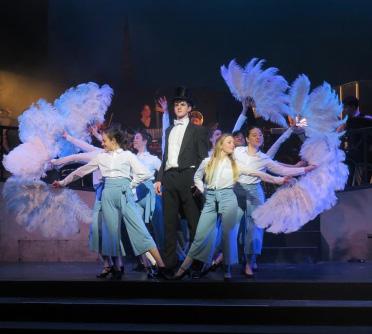
Labyrinth: Knossos, Myth & Reality is the The Ashmolean Museum’s new major exhibition, tracing one of the most compelling Greek myths and celebrated stories of modern archaeology. According to legend, Knossos, in Crete, was home to a labyrinthine palace built to contain the Minotaur; a half-bull, halfhuman monster. The excavation of the Palace of Knossos between 1900 and 1905 led to the discovery of several fascinating objects which will now be shown at Oxford’s largest museum.
The exhibition features over 200 artefacts, more than 100 of which are on loan from Athens and Crete and have not been displayed for over a century. Highlights include an amphora decorated with paintings of Theseus and the Minotaur, a coin minted at Knossos which depicts
the Cretan labyrinth, as well as an elaborate marble sculpture of the Minotaur estimated to be over 1,700 years old.
The objects not only showcase the skill of Minoan craftspeople, but also indicate the origins of the myth of the Minotaur. Minoan seal-stones show how images of people leaping over bulls were condensed into the head of a bull and the legs of the leaper, foreshadowing the monster that would become one of the most enduring Greek myths.
One of the principal aims of the exhibition is to shed light on the road to the excavation at Knossos, which was by no means easy. Travellers attempted for centuries to uncover the mythical Labyrinth, leaving behind a trail of misleading evidence. It was in 1878 when Minos
Kalokairinos, a Cretan businessman and scholar, came across the remains of the palace. Under the Ottoman Empire, however, he was prevented from carrying out a full excavation, and any noteworthy discoveries risked being removed to Constantinople.
In the years that followed, various archaeologists competed for the excavation rights. In 1900, the British archaeologist and former Director of the Ashmolean, Sir Arthur Evans, was given permission by the Cretan authorities to begin digging at the site. Evans’ documentation of his findings was fundamental to an understanding of the archaeology of Knossos, and several of the excavation plans, artworks and records from the Sir Arthur Evans archive feature in the exhibition.
There is also an interesting multimedia element, as visitors are offered two immersive experiences inspired by Knososs. A RESTORATION (2016) by Turner Prize winner Elizabeth Price will be shown in the third gallery. A 15-minute video, narrated by a fictional chorus of museum administrators who use Arthur Evans’ archive to figuratively reconstruct the Palace at Knossos within the museum’s computer server, will also be shown. In the second gallery, visitors can experience a unique virtual tour of the Palace reimagined in the 5th century BCE thanks to the digital creation of the site in the video game Assassin’s Creed Odyssey. The film was created especially for the exhibition by Ubisoft to demonstrate the research involved in creating the game.
Reflecting on the exhibition, Dr Xa Sturgis, Director of the Ashmolean, said:
“This is an exhibition that only the Ashmolean could mount. Since 1903, the Museum has held the largest and most significant collection of Minoan archaeology outside Crete thanks to one of my predecessors as Ashmolean Director, Sir Arthur Evans. Long thought of as an archaeological pioneer, Evans and his interventions at Knossos are now being reconsidered in their historical context. The exhibition offers both an exploration of Minoan culture and Greek myth, and a deeper look at British archaeological history.”
Labyrinth: Knossos, Myth & Reality is open from 10th February 2023 until 30th July 2023. Entry to the exhibition is free for students of the University of Oxford.
The exhibition starts off well with a section dedicated to the minotaur, and an impressive centrepiece of a statue of the Minotaur on loan from the National Archaeological Museum of Athens. This section also contains prints by Pablo Picasso, Michael Ayrton, and Mark Wallinger, as well as a short video by Zahra Hall that tells the story of Theseus and the Minotaur. Interestingly, this video seems to be the only reference to Theseus in the whole exhibition. Presumably, the Ashmolean wanted the Minotaur and the setting of the labyrinth itself to take precedence, but this does feel like a strange omission.
The exhibition then turns away from the mythology of the labyrinth and into a small section on other labyrinths. This is a jumble of historic literary sources that reference the labyrinth at Knossos, or simply any labyrinth at all, and it’s confusing to go from such a strong and focused opening to the exhibition to a section that almost doesn’t make sense at all. The best part of this section is by far the trio of carved stone fragments that come from a site near Crocodilopolis that supposedly inspired the creation of the labyrinth at Knossos. The largest part of the exhibition is the section dedicated to the excavation of Knossos, with
items from Sir Arthur Evans’ archive and some of the major archaeological finds on display. This includes extracts from Evans’ own diary, where he concludes that the fabled labyrinth and the palace of Minos are one and the same.
Unfortunately, this is where the exhibition starts to fall apart. The exhibition had started so boldly with the Minotaur theme , that by the time you’d walked past the statues and the artwork of arguably the most wellknown character in Greek mythology, anything less than spectacular would’ve been a disappointment. In this case, the hordes of letters, documents and maps definitely constituted a dis-
appointment. They’re still interesting by themselves, but there is a sense that the curators didn’t really think much about the layout of the exhibit. Wouldn’t it have been more exciting to put the minotaur-related items at the end of the gallery, building up tension while you browse through other items until you finally turn the corner and you’re confronted by the statue of the half-man half-bull? This approach would have created a sense of dramatic irony that is completely lost in the exhibition as it is. We all know there’s going to be a section dedicated to the minotaur, so why not create suspense by having us wait to see it? This would leave one of the more visu-
ally exciting collections of items, and probably one of the most accessible collections of items to those who aren’t familiar with the meta discussions about archaeology and archaeological practice until the finale, ending the exhibit on a much bigger high.
It’s not all bad - there’s a great selection of items across the gallery, and it’s good to see that more obscure topics like Knossos and the work of Arthur Evans are getting their chance to shine. I just wish that the curators hadn’t gone all in with the minotaur section if they wanted the archaeological reality of Knossos to be front and centre to the exhibit.
Beneath the stunning set of crystals which illuminated the stage of the Old Fire Station, Peacock delivered a night of camp humour, heartfelt reflection, and unabashed queerness which its audience is unlikely to forget. Having already performed to crowds in Newport, Stroud, Bristol, and Bath, this touring production had clearly undergone many steps in its development to reach the level of entertainment value on offer to the Oxford audience.
Written by Douglas Murdoch and directed by Lex Kaby, the co-founders (alongside creative producer Holly Jeffries) of Greedy Pig Theatre Company, Peacock is a heartwarming story of self-discovery and the freedom it provides. The music-infused play follows Seamus (Ben Armitage), a young bisexual man who expands his horizons by experimenting with makeup and falling in love with drag queen and noncommittal clairvoyant Tyrell (Kofi Dennis). With the help of the passionate Violet (Alexandra Wollacott) and customer-turned-colleague Noah (Toby Mitchell), the two lovers explore the trials and tribulations of a new relationship and what it means to live as your true self.

According to Murdoch the inspiration for Peacock “came from a very real place for me. Over lockdown, I started experimenting with makeup and got to a place where I felt quite comfortable with it. However, then when lockdown ended and I was faced with stepping out of the house wearing makeup, I was suddenly confronted by this uncomfortable and complex scramble of feelings.” In the play Seamus,
inspired by Tyrell’s confidence in drag, is drawn to makeup but is paralysed by fear when he wears it in public for the first time.
The development of Peacock picked up steam in early 2022 when Greedy Pig held workshops to “establish what makeup and masculinity meant to men in the South West”. The summer saw the company undertake a script Research & Development (R&D) process in which the actors and producers experimented with improvisation and devising. One stage of the process involved going out into the streets of Bath and speaking to the public about their thoughts and experiences regarding men wearing makeup. All of this factored into what would eventually become Murdoch’s final script. Greedy Pig commented that “it is interesting to look back on the R&D show now with a full complete script, as some elements are so different, and some scenes are near-identical to what was created in the R&D room”.
The music in Peacock forms an essential part of the production, whether it’s a drag lip sync number to a Mis-Teeq song or an apology delivered as a Lizzo cover. The show ends with all four characters performing an energetic and enthralling routine to the tune of Little Mix’s “Power”. It’s the realisation of the previous hour of Seamus’ slow buildup in confidence. Despite being spooked earlier at Tyrell’s drag performance, the end of the play sees a Seamus proud to provide impromptu backup to his boyfriend alongside Violet and Noah.
All four actors bring something unique to the table
that makes Peacock magical. Armitage perfectly conveys the awkwardness and frustration of Seamus as he reckons with his lack of confidence. Dennis’ physicality as Tyrell both in and out of drag provides an undeniable confidence to the character. Wollacott and Mitchell provide many of the comedic high points of the show with two contrasting approaches. While Wollacott as Violet delivers many hilarious lines trying to keep her friends entertained, it’s Mitchell’s lack of over-the-top dialogue that makes his performance as Noah shine. His monosyllabic responses to the other three’s campy energy drew many laughs from the audience. A highlight of the show humourwise was seeing Seamus and Noah decide to get over their inhibition and put eyeshadow on each other’s eyes, both humming to distract themselves from their fear. The scene ends with the two of them screaming at each other while daintily dabbing makeup onto their faces.
Though the show has a lighthearted core, it isn’t afraid to explore serious issues relating to mental health and anxiety. Tyrell is afraid of what his brother will think when he is told he will be attending one of his performances and puts up a front of masculinity whenever he speaks to him. Seamus gets irritated in a phone conversation with his mother after she seems to
be unable to understand his bisexuality. Violet, after being elected to the parish council, worries that the other much older members will underestimate her and push her around. In easily Peacock’s most powerful moment, Noah talks candidly about how men like him don’t get asked about their mental health often and how many men struggle with communicating their worries for fear of seeming weak. Greedy Pig worked with the men’s mental health charity HUMEN to ensure their depiction of this important issue was authentic.
Peacock was a delight to watch with a script that was
both hilarious and heartwarming and a cast that was unafraid to give their all to the performance. The set design was also strong and it was remarkable how the landscape of the stage could shift with a few quick changes of props and backdrops. The raucous applause the show received at its conclusion is testament to the heart, soul, and wit that went into this production.
Peacock was performed at the Old Fire Station on 22nd February, the last date of its 2023 tour.
Image Credit: Greedy Pig Theatre Company
Oxford SU demands that every college by the end of March 2023:
1
TARGET: Adopts a target for net zero carbon and biodiversity net gain at least as ambitious as the central University’s 2035 date.
STRATEGY: Publishes a strategy as to how they will achieve this target, with annual reporting, covering scope 1, 2 and 3 emissions as well as biodiversity impacts, and including or alongside a policy commitment to divest from fossil fuels.
2
3
ENABLERS: Implements the appropriate governance and enablers to enact this strategy, including a sustainability committee with student representation, and dedicated staff time.
Arecent poll by the Telegraph found that more than half of the UK population (54%) believe that Net Zero is ‘unachievable’ by 2050, despite the fact that the UK government has made a legally binding commitment. So why is the UK population so unconvinced by the government’s promise? And are they right to be sceptical?
It’s been 4 years since the UK government pledged to reach net-zero greenhouse gas emissions by 2050, announcing a series of sectoral policies and plans that culminated in the Net Zero Strategy, released in October 2021. This strategy was significant in the history of such policies because it included delivery mechanisms to help achieve the targets, thereby holding the government accountable. The key commitments outlined in the strategy included a target of 100% clean energy by 2035, a ban on petrol and diesel car sales by 2030, and business models to support hydrogen and carbon capture industry.
Net Zero refers to the bal
limit the temperature change to 1.5 degrees Celsius.
However, the UK Net Zero strategy has been subject to extensive criticism and controversy, including a humiliating court case filed against it by Friends of the Earth, Good Law Project, and ClientEarth. The outcome was a win for climate activists, with the High Court concluding in July 2022 that the Government’s net zero strategy breached the Climate Change Act and needed to be strengthened. Such incidents don’t exactly inspire faith in the likelihood that the government will stick to the commitment.

Giving credit where credit’s due, the UK has had some marked success on its journey towards this goal. In some areas, the UK has ambitious targets supported by clear and credible policies, including committing to a fully decarbonised power sector by 2035. The UK’s greenhouse gas emissions fell by 40% over the last 3 decades, and half the UK’s electricity generation in 2019 was from low-carbon technolo
which I’ll admit is a little easier on the eyes.
is incompatible with the 1.5 degree Celsius temperature limit and will not help address the current energy crisis.
What’s important is that people are talking about it. 66% of the UK public is now aware of the concept of Net Zero, and climate anxiety is at an all time high, with 82% of people ‘concerned about climate change’.
However, on the other hand, the UK has witnessed some embarrassing U-turns when it comes to its commitment to the Net Zero target which have cast doubt on the true extent of its dedication to the goal. The ban on fracking was lifted by Liz Truss during her short stint in Downing Street and then reinstated by Rishi Sunak, in a move that made many in the UK breathe an audible sigh of relief. However,
Unfortunately for the UK population, and the planet, key weaknesses remain in the Net Zero Strategy that need to be addressed in order for the UK to meet its climate targets. Under the current policies, projected emissions in 2030 will be 58-63% lower than 1990 levels. This is a long way behind the 2030 NDC, which targets at least a 68% reduction in Greenhouse Gas emissions. The lack of transparency surrounding policies and their reliance on technological innovation, for example, investment in carbon capture, also reduce the prospects of success. Additionally, under 40% of the emissions reductions required to meet the UK’s NDC are supported by policies with proven delivery mechanisms and sufficient funding. Overall, CAT rates the UK’s net zero target as acceptable, with room for improvements that the UK government will hopefully implement in the updated 2023 Net Zero Strategy, and the UK’s climate targets, policies, and finance ‘Almost
UK will need to severely step up its game. Just as one example, the UK will need to quadruple its carbon electricity generation. Although it’s clear that some progress is being made, currently the UK’s climate change strategy appears to be dominated by a pervasive failure to live up to it’s grandiose promises. It is also questionable whether even reaching the Net Zero goal will be sufficient to prevent climate change from causing serious damage, with some studies finding that we have already passed some tipping points. However, there is hope. The CCC believes that, although highly challenging, Net Zero is possible for the UK by 2050.
By Jasmine WILKINSON“…the UK has witnessed some embarrassing U-turns when it comes to its commitment to the Net Zero target.”Editors: Emily Hudson, Nicole Hasler, Archuna
We are creatures of habit, and with the UK population drinking around 98 million cups of coffee a day, our infatuation with the morning brew is hard to beat. Currently the most consumed psychoactive substance in the world, caffeine has been reported to not only keep us feeling energised, but also to positively affect our mood and general health.
Having just been plagued with a bout of the fifth week blues myself, a drink that can both help me finish a problem sheet and put a smile on my face is very appealing.
The key to unlocking the full benefits of coffee is not as simple as knocking back several double shots a day, however (especially for any sleep-deprived and overworked student).
Despite differing views within the scientific literature on the effects of caffeine and the optimal dose, some common threads shine through on how those 98 million cups can have their maximum impact.

Fellow coffee fiends may be disappointed to find out that coffee is somewhat of a trickster. That buzz we get is not from any real energy boost, but instead from caffeine’s ability to fool our body into ignoring signals that we are tired.
As you use energy throughout the day, a chemical called adenosine starts to build up. Adenosine binds to cells and promotes sleep by telling cells to slow down. The active ingredient in coffee, caffeine, binds
to adenosine receptors (molecules on the cell surface that allow them to respond to signals) and prevents adenosine from attaching. This leads to the feeling of alertness associated with drinking a strong coffee.
Frustratingly, the deceptive nature of a Cup of Joe means we are under the illusion of having more energy than we do. Once coffee stops having its effect, we are hit with the full force of any energy deficit. Unfortunately, the only real way of getting back our energy is to sleep. Surely the way to combat this is just to drink more coffee? Well… yes, but also no. This may delay the post-coffee slump but comes with serious health drawbacks. Excessive caffeine consumption limits and even reverses the benefits of drinking it in the first place. It has been reported that high doses of caffeine can promote anxiety and cause further sleep deprivation as well as gastrointestinal symptoms. Based on this, the FDA recommends that people do not exceed 400mg of caffeine (approximately four cups) a day.
How do we make the most of our coffee habits?
It is not uncommon for students to report chronic sleep deprivation, with studies showing we achieve around six hours of sleep a night – much below the recommended 8-10 hours. Resting is often sacrificed as students attempt to balance work, exercise, and an active social life – therefore, maximising the energy boost from coffee whilst avoiding the nega-
tive side effects of drinking too much would be the dream.
Despite the popularity of a coffee with breakfast, this may not be the most effective time to consume it if you want to achieve maximum alertness. Whilst you sleep, adenosine levels decrease, meaning coffee seems less potent first thing in the morning. In addition, cortisol (which caffeine acts to increase) levels are high after waking and then drop throughout the day. It may therefore be beneficial to have your first shot of espresso in the late morning. Fur ther evidence for switching up your morn ing coffee is that food can slow caffeine absorption, making it a poor breakfast companion.
The question of when we should drink coffee to achieve maximum alertness is not a new one. In fact, it is essential to occupa tions that require fast reaction times. For this reason, US Army researchers developed an algorithm that could predict the optimal dose and timing of coffee consumption throughout the day based on a person’s history of caffeine intake and sleep. Working in the army means soldiers need to be able to respond quickly in emergency situations while often running
on less than 5 hours of sleep a night. To help combat this, researchers created the 2BAlert Web tool, which designs a caffeine schedule unique to the individual to ensure that alertness never drops below a certain threshold despite sleep deprivation. Crucially, the tool demonstrates that by timing it right, a person could decrease their caffeine consumption by 65% (thereby avoiding any negative health effects) whilst still reaching the same level of alertness. The pitfall of algorithms like this is that they are based on population averages and don’t take into account all
limit being hit by anything from 2 to 5 cups depending on where you get your java. If you want to feel the buzz without overdoing it, you need to choose where you get your cuppa wisely.
It’s all about… you
The overriding factor in determining how we respond to caffeine (or any drug for that matter) is the individual. Particularly when it comes to coffee, previous coffee habits and genetics are two of the main factors contributing to how energised we feel after an espresso. Several genetic variants in the genes responsible for caffeine metabolism and the adenosine receptor affect how quickly we process and respond to coffee. This means some people may be able to bypass the “no coffee 6 hours before bed” rule if they rapidly process any coffee consumed; others, however, may get jittery after a single shot.
high street chains and noted significant differences, with some of the highest scoring contenders containing up to six times as much of the psychoactive ingredient as the lowest. Differences like this makes it hard for the average person to measure their daily caffeine intake in cups, with the 400mg
The question of whether there is a right way to drink coffee remains unsolved. We can speculate about the optimal time and dose of caffeine, but no single answer will apply to the entire population. Perhaps the most disappointing answer of all is that although we can trick our body into thinking it is awake, the only real way to feel more energised is to have enough sleep.
Regrettably, it is sixth week and a flurry of essay crises awaits me – I think I’ll stick to the espresso.
By Lola BELLBlack holes are the source of dark energy, suggests a paper that has taken astronomers by storm.
Dark energy is the name given to the mysterious “missing” 70% of the mass in our universe. According to observations, our universe is expanding, at an increasing rate. In other words, the distance between things in the
universe: stars, galaxies, planets is increasing. This expansion, however, doesn’t exactly correspond to the amount of mass astronomers can detect. There must be some invisible, “dark” mass, and this is what we call dark energy. The source and nature of dark energy are considered to be some of the biggest puzzles physicists are working on today.
On the outset, it is hard to guess what this would have to do with black holes. Black holes are thought to be at the centre of each galaxy, the echoes of large stars that col-
lapsed under their own gravity, some with a gravitational pull equivalent to millions of suns. Black holes “accrete” all matter that comes near it, and in this way increase in size. First predicted in Einstein’s theory of relativity, black holes were initially thought to be a mistake in the mathematics. For a long time, their existence was hotly contested by physicists, a
debate that was brought to rest for good upon the first photograph of a black hole, taken as recently as 2019.
The expansion of the universe is also predicted in the theory of relativity, something that Einstein initially called his “biggest blunder”.
By Emily HUDSON“...some of the biggest puzzles physicists are working on today.”
the middle shelf of the oven for 30-35 minutes, checking that a skewer or knife comes out clean.
Place the cakes onto a wire rack and allow to cool completely (the most important step!) –remove them from the tins and take off the parchment paper when the tins are cool enough.
Now that the cakes have cooled completely, in a large bowl, beat together the cream cheese and
It may not be Valentine’s Day anymore, but that shouldn’t stop you from treating your partner and/or friends every now and then. This red velvet cake uses a simple recipe for a fluffy, chocolatey sponge and a delicious cream cheese icing, and using 6” tins makes it the perfect size to share between two.

Ingredients
For the cake:
85g unsalted butter
200g caster sugar
2 medium eggs
20g cocoa powder
1 tsp red food colouring
1/2 tsp vanilla extract
170ml buttermilk
200g plain flour
1/2 tsp bicarbonate of soda
1 1/2 tsp white wine vinegar
For the cream cheese icing:
100g unsalted butter (room temperature)
100g icing sugar
200g cream cheese
1/2 tsp vanilla extract
Method:
Grease and line two 6” cake tins.
Preheat the oven to 170°c. In a large bowl, beat together the butter and sugar using an electric whisk or wooden spoon until pale and fluffy. Add the eggs, buttermilk, red food colouring and vanilla, and beat again.
In another bowl, mix together the flour, salt and cocoa powder.
Gradually add the dry ingredients to the wet ingredients, mixing with a wooden spoon until smooth.
Beat in the vinegar and bicarbonate of soda for a good few minutes until fully combined. Divide the cake mixture between the two tins and bake on
room temperature butter with an electric whisk or wooden spoon. Gradually sift in the icing sugar and add the vanilla extract, and beat again.
Place one of the cakes onto a serving plate and spread with a heaped spoonful of the cream cheese icing.
Place the other cake layer on top and spread on the remaining icing, using a spatula or palette knife to cover the sides. Slice and enjoy!
This Week: ItaliAmo Cafe and Deli
by Susie BarrowsPizza for a takeaway lunch doesn’t really work. A whole pizza is not portable, and a slice is not enough food. Enter the humble calzone, a folded-over pizza sandwich (my Italian ancestors are rolling in their graves as I say this) which can be easily consumed on your desperate rush between lectures.
ItaliAmo is not only known for its calzone, though: you must also try their arancini, a southern Italian food which is essentially deep-fried risotto, the
epitome of all comfort foods. The ragu filling is traditional (think bolognese sauce with mozzarella melted on top) but the aubergine veggie alternative is equally as deliciou.
They also offer focaccia-based sandwiches and some pasta options, as well as a wide range of traditional Italian desserts including various flavours of cannoli. Prices range from anywhere between £1-10.
The OxStu recommends… Margherita calzone (a basic option but includes such high quality ingredients that it doesn’t need to be complicated!) (£4.00)
Each week Stephanie Nourse provides a new veggie-friendly recipe for midweek meals - check our website for updates!
Cook time: 25 minutes
Cost per serving: £2.40 (excluding oil, salt and pepper)
Ingredients:
½ cauliflower
1 jalapeño salt and pepper
Method:
1. Preheat the oven to 220 degrees.
Pour this mixture over the cauliflower and toss to coat. Add the breadcrumbs and toss again.
Editors:
Susie Barrows, Asmaani Shukla oxstu.food@gmail.comThis vegan twist on the classic Mexican taco is the perfect speedy yet nutritious recipe to brighten your week. The combination of crispy cauliflower, buttery avocado, kick of jalapeño and sriracha and a zing of lime makes for a delicious dish to enjoy solo or to share. If you can’t find red cabbage, some iceberg lettuce will also do the trick.
Prep time: 10-15 minutes
mini corn tortillas
½ tbsp sriracha
1 tsp maple syrup (or honey if vegetarian)
1 ½ tbsp plain flour
2 tsp cornflour
1 tsp paprika
1 tsp cumin
2 tbsp breadcrumbs (fresh or dried)
½ avocado, sliced
handful of chopped red cabbage
½ lime
2. Chop the cauliflower into florets.
3. Mix together the sriracha, maple syrup and 1 tbsp water and pour over the cauliflower florets and toss to coat. Season with the garlic granules, paprika and cumin, and salt and pepper to taste.
4. In a separate bowl, whisk the flour, cornflour and 3 tbsp water together, adding more water if needed so that you have a pourable consistency.
5. Add the coated cauliflower to a baking tray and bake for 25 minutes.
6. Meanwhile, finely chop the red cabbage and slice the avocado and jalapeños.
7. Heat the mini tortillas for 30 seconds in the microwave.
8. Assemble the tacos with the cauliflower, avocado, red cabbage and jalapeños and serve, finishing them with a squeeze of lime and extra drizzle of sriracha to taste.

George
Santos is a gay American congressman who has become infamous for bending the truth about his past, and then being caught out about it.

Here’s a selection of his untruths, ranging from bizarre to distasteful to embarrassing.
having worked in the south tower. In reality, his mother’s 2003 visa application to the USA revealed that she hadn’t entered the country since 1999, and, on her visa application, she described her occupation as “home care nurse”.
3
1–
Santos claimed that his maternal grandparents were Jewish refugees who fled the soviet Ukraine and then Belgium to escape Nazi persecution. However, Jewish newspapers Jewish Insider and The Forward stated that Santos had completely invented this Jewish heritage – his maternal grandparents were both born in Brazil. In an interview a week later, Santos claimed that he meant he was ‘Jew-ish’ and never claimed to be Jewish, despite referring to himself as an “American Jew” and a “Latino Jew” several times during his campaign.
– Santos claimed to have been a producer for the superherothemed musical SpiderMan Turn Off the Dark, even though the other producers deny his involvement, and there is no mention of him in the playbills for the musical. Furthermore, he was also a customer service representative for a Coloradobased TV provider at this time, meaning the commute between his two jobs at the time was almost 2000 miles 4
5
ing, if improbable, candidate by conjuring up an elaborate backstory is scary, but it also goes to show just how far (and just how delusional) people will go to try to win. His (partly disproven) backstory of being a chronically-ill gay Latino Jew whose mother was affected by 9/11 meant that he appealed to so many groups of voters, and especially in groups that don’t traditionally vote for the Republicans. By lying, he was making himself the perfect candidate.
His reluctance to admit
to being a drag queen is perhaps also a part of this. Right now, a swathe of antidrag laws are being passed across the United States, and so it would seem that Santos would rather deny being something that the republicans hate so much, and just past it off as being young and having fun, rather than make himself seem to be an undesirable political candidate.
2
– Santos claimed that his mother was the “first female executive at a major financial institution”, and that she survived the 2001 attack on the World Trade Centre,
– When campaigning in 2020, Santos claimed to have had a double knee replacement, and to have been diagnosed with a brain tumour, for which he received radiation treatment. This is on top of his supposed immunodeficiency and acute chronic bronchitis. When campaigning again in 2022, Santos became defensive when asked about his brain tumour, and refused to give any details about it.
– Perhaps most famously, George Santos was identified by Brazilian drag queen Eula Rochard as having been a drag queen who went by the name Kitara Ravache, and numerous photos and videos of him performing spread across Twitter. Santos responded to these claims by admitting that he had dressed up as a woman before, but that he was definitely not a drag queen. The hilarity and hypocrisy of the situation meant that Santos (and Kitara) were parodied in the media, most notably on Saturday Night Live, and he even got into a Twitter feud with legendary drag queen Trixie Mattel after she hit back that the reason the impersonations of Santos were so bad was because “the source material was weak”.
The Republicans’ reluctance to get rid of Santos is obviously concerning (what else could he be lying about?), but there’s a sinister quality to Santos’ lack of ability to take responsibility and own up to the things that he has very obviously lied about.
This reliance on setting himself up to be an amaz-
It isn’t hard for a bop to go wrong. In fact, if it’s going well, then something isn’t right. The false sense of security afforded by being surrounded by those in your college, knowing full well you will end up somewhere safe enough, makes for a vodka-heavy cocktail of cheesy pop and a hearty hangover. But what else have we got to do on the weekends? 9am lectures are no longer an excuse and with our beloved bridge hijacked by the raucously rogue locals, you are left with little choice. Thank God for the entz reps.
Let us begin with the costumes. Some go suspiciously sexy, others actively unattractive. Some verge into extravagant efforts, and others monotonously boring. It is hardly uncontroversial to say a Stem student in a lab coat, or an earth scientist in a hard hat isn’t the thematic wonder they might claim. Most do put in the effort, and one can find a surprisingly broad array of attire not always attributed to the cloistered formality of Oxford colleges. Well, at least I’m always surprising myself - Michaelmas term saw me go from being a cowboy
(tenuous for a careers day theme), to Indiana Jones (yes, the cowboy hat was reused), to a pirate, to a 90s teenager (so my normal way of dressing), to a fisherman (based on a new years resolution of plenty more fish in the sea) and even a stint as a silk trader (think a pirate with scarves). My secret? Rope - It is genuinely versatile and can make anything rag-tag into a vaguely themed out fit.
Naturally, the collegiate flavour of bops cannot be ignored. Jesus’s possessed an ultraviolet spectacular of a bar, with readily avail able bop juice. The revelation that I belonged to another college became even more of an excuse to drink. So too did New’s pirate-themed plush takeover made for a thoroughly enjoyable night, even if suffocatingly sweaty (let us
Rordon Gamsay
Rordon loves to take sides. When people come after his precious newspaper, he’ll do anything to fight for his cause- anything but actually write his articles on time. He got so excited about the prospect of taking sides this week that he almost ended up joining in with a protest. That was until he woke up the morning after a blind date with the worst hangover of his life. A fellow campaigner told him that the government induced it with space lasers in order to silence him. Here are the Roasts.
The vox populi is crystal clear. The blue newspaper isn’t remotely useful unless you’re wiping your shoes, the people declare, but the red newspaper… It might as well have been brought down from Mount Sinai by Moses himself. There’s a stark difference in quality, hundreds of obvious distinctions, that make the red
newspaper (and only the red one) a part of the cultural zeitgeist. The blue newspaper is meaningless tosh.
“The red newspaper is a bastion of investigative journalism, pioneering the fresh technique of accompanying every article with an Instagram poll pie chart. The blue newspaper is a tabloid rag churned out by hacks. They discontinued their crossword because their readership thought it was a maze,” Rordon was told indignantly. It truly is a tragedy that we didn’t notice sooner.
It’s Valentine’s Day, and for Rordon that means only one thing- blind dates. Of course, Rordon was keen to show off his chat, claiming to have “established the rizzlamic state” of eager followers, who we suspect, are his OxYou devotees. But, when date night came, he was rather pleased with its aftermath. In fact, Rordon was last this ecstatic when he got a happy birthday from DD. “Love is
blame this on Plush being Plush). Of course, it required one to retain some supposed function in order to make it back to college, but this didn’t seem to bother most. Even when gate-crashing the St Anthony’s Halloween bop, there seemed to be an erroneous enjoyability to the night. That said, my futile attempts to convince the porter that I was in the third year of a D-Phil, despite being a baby faced 18 year old fresher, seemed to sour my experience. And then there was my own college’s binge drinking bonanza, where some were in bed by eleven (generally not by their choosing), others hijacked the DJ sets, and I found myself stuck in the rear gate trying to get a kebab. Not a bad night if you ask me.
We can’t forget the dangers. Half the
blind,” he explained, “or at least they must be to have fallen for me.”
This week, Oxford had a celebrity guest visit from a celebrated champagne- ahem, campaign socialist, who’s currently promoting his new book.
When Rordon posed the challenging questions, the politician’s spokesperson had answers: “I think it’s shocking that people would accuse this book as having been written by the 1%. It’s a slap in the face to our team of minimum wage ghostwriters who’ve weathered some horrible working conditions to put this project together,” Rordon was told.
When quizzed on whether Marx and Engels would have recorded an Amazon audiobook of their work and sold it for $20, the spokesperson responded, “It was a very different time back then. But if we want to talk accessibility, Marx was writing his
college tries to remember what on earth actually happened in their post-bop brunch, as the other half try to forget. College-cest, pissed-off porters and even missing pets. It’s all happened, its just we struggle to piece it together in the constant memory loss of university induced drinking.
But as one always finds within Oxford institutions, pretentiousness is rife. We laud bops as some stolen imperial wonder to make up for the lack of native jewels in Oxfords nightlife crown. Do they really compensate for the poor quality of clubs? Of course not – bops are just school discos on steroids. This isn’t to say they aren’t delightfully enjoyable, and if I could remember more from them, I’d have only good things to say. But we can’t take them too seriously; in an environment of endlessly uptight formals and black tie balls, perhaps bops are one of the few opportunities to embrace the unseriousness of our student status. Call me a critic, or even a rambler, but as we sit and lament our lack of nightlife, perhaps bops become more of a symptom than the cure. Oh well, I’m hardly one to turn them down.

piece in German. That’s not accessible to anyone over in America. Our book, on the other hand is going to be published in 110 different languages. It’s going to guarantee us millions in… satisfied readers.”
Rordon has often heard it said that incompetence can sometimes be mistaken for malice. It therefore comes as no surprise that this week’s protestors mistook the city council for an evil empire. Did bureaucracy halt plans for Oxford train station, or do they not want us to leave? Why’s there so much scaffolding in Oxfordis there something they don’t want us to see? And why God, why did they shut down Burger King? Protestors were convinced that the council were masterminding an intricate Orwellian future for the entire city. If they’d made it to Broad Street a week earlier, they’d have looked up to see a giant reindeer left there since Christmas, and probably would’ve gone back home.
Deputy Editor: Dani Kovacs
Section Editors: Bradley Beck, Joe Sharp
email: oxstu.sport@gmail.com
heading Williams after Jost Capito’s shock departure the month before. The continuation of Vowles’ 20 year tenure at Mercedes seemed to be a given, especially considering his instrumental role in their historic eight consecutive constructor’s titles. Ergo, Vowles’ move is a significant one, betraying both Dorilton Capital’s frustration at yet another 10th place finish in the Constructor’s championship and Toto Wolff’s realistic view of the future given his close personal and financial ties with Williams…
It was the apparently collective decision among the F1 team principals to stage a paddock-wide mutiny, triggered by Mattia Binotto’s unsurprising departure from Ferrari after three blunder-ridden seasons.
Though RedBull’s Christian Horner, Mercedes’ Toto Wolff and Alpha Tauri’s Franz Tost have headed their respective outfits for the better part of half a century collectively (not to forget Drive To Survive star Guenther Steiner’s 9 year reign at Haas), the chaos has ensured that four of the ten team principals are newly appointed. With the addition of Krack and Szafnauer, both taking over Aston Martin and Alpine in 2022, six of the ten have held tenure for less than two seasons. It’s safe to say the season ahead will certainly be one of adjustment and new approaches up and down the paddock, though the winners and losers of the transfers remains to be seen. Bring on 2023.

February 25th was the day I had been waiting for ever since I confirmed my place at Oxford.It brought the chance to watch my beloved Bristol Rovers face Oxford United away at the Kassam Stadium. Both sides entered the game winless in their previous six League One fixtures, making the fixture crucial to regain momentum and avoid entering the relegation battle.
A half-hour bus journey from the city centre left us a short walk away from the stadium, passing by laser tag, bingo and bowling venues – all undoubtedly tempting alternative forms of entertainment for Oxford fans during this difficult run of form. The latter, Hollywood Bowl, was an unlikely source of pre-match activity – with fans of both sides packed amongst the arcade games in the queue for a drink. While there were mentions of combat between the two sets of fans in the stadium’s car park, a large police presence limited any clear problems leading up to kick-off.
Although not picturesque, the away end was decorated with an array of stickers from each fanbase it had housed. No complaints could be made about Oxford’s “footy scran”, with a top-tier steak and ale pie coming in at £4 – a reasonable price compared to many grounds’ stalls. Chants of “we’ll sit where we want” rang around the Kassam, as the many Rovers fans disobeyed the seat allocations in a bid to stand closer to the neighbouring United supporters – for obvious reasons. The growing atmosphere provided by the sold-out away end as kickoff approached was not matched in any sense by the home crowd.

A desperate attempt to encourage some cheers during Oxford’s line-up announcement fell flat, setting the tone for a chant-
Bradley Beck, sports editorless afternoon.
Two Rovers goals in quick succession after 20 minutes of play brought the best out of the away day experience – with our fans strongly in voice for the remainder of the half. Shortly after, attention shifted away from the game as commotion unfolded off the pitch. The Kassam Stadium’s strangely incomplete structure, with three stands and an exposed open space behind one goal, provided a perfect view of a comical police foot chase in the car park. Any chance of reviving the spirit of those in the unfilled United stands at half time diminished, as Rovers entered the break with a comfortable margin. This must have been expected, as a highly unpassionate quiz was the half-time entertainment of choice.
The second half saw signs of hope return for Oxford United, with further pressure on Rovers resulting in many early chances. With the aid of the continued, emphatic support, Rovers held firm despite multiple defensive howlers – notching a third goal to secure the three points. The view of the Kassam’s car park came to good use once again after this, as “cheerio” was sung to those flooding out of the stadium early.
No complaints could be made about Oxford’s “footy scran”, with a top-tier steak and ale pie coming in at £4 – a reasonable price compared to many grounds’ stalls.
Among those who remained until the final whistle were two United fans that hung a “time to go Karl” banner from the largely empty stand opposite the away end - signalling their discontent with manager Karl Robinson. The duo grappled with the banner desperately as it flapped in the wind. Even when the message was eventually clear to see, it faced in the opposite direction to the views of both Robinson and the box seats where the United board would be seated. Nevertheless, these two were not the only ones with this opinion. The moments of the afternoon that
united the two sets of fans were joint chants of “you’re getting sacked in the morning”.
As the game concluded, Rovers fans basked in the glory of securing a league win after a painful wait by celebrating with the players – then receiving Klopp-like fist pumps from manager Joey Barton. The victory continued a remarkable hot streak for Rovers at the Kassam Stadium, with the side now winning during seven of their last nine visits to Oxford –making it a safe away day as far as getting a good result is concerned. As the away fans remained in numbers beyond the final whistle, the home crowd understandably vanished –bar the duo with the banner. Their hopeful shouts of anger down to the touchline were not in vain, as Karl Robinson’s sacking was announced by United less than 24 hours after the end of the game.
My first away day at Oxford United’s Kassam stadium was a brilliant one. It could be argued that this was largely because of the result of the game and the nature of the away fans – both dependent on the supported side. Nevertheless, the odd placement and structure of the Kassam Stadium provided a backdrop for moments of madness that would have made the game memorable regardless of the outcome.
It is almost time for ‘lights out and away we go!’. The 2023 season of Formula One is less than a week away and it promises to be an exciting season opener in Bahrain. As the pre-season testing wrapped up on Saturday, what we have seen has perhaps left us with more questions than it answered… Here is the (thoroughly unqualified) verdict and predictions for the pecking order of the teams heading into the new season.
1. RED BULL
Perhaps the easiest pick on the list, the defending champions picked up exactly where they left off at the end of last season and comfortably look the strongest, especially when defending champion Verstappen is behind the wheel. Safe to say that clinching the 2021 drivers’ title did wonders for the Dutchman who has been racing with incredible confidence and skill ever since - 2023 could become yet another one-man title fight if Red Bull’s rivals fail to step up. Max Verstappen is certainly the man to beat in 2023.
2. FERRARI
Ferrari are said to be quietly confident about testing results, although this might mean they know something we don’t, since while the car looked pretty good, it seemed clearly somewhat behind the Red Bull. With Fred Vasseur now in charge, the prancing horses will hope that the alltoo-common strategy blunders of recent years are a thing of the past, and that this year they can sustain a year-long title challenge. Leclerc seems hungry as ever for a first drivers’ championship, while Sainz will have a lot to prove after a slightly underwhelming 2022 campaign. The ingredients are all there and yet it somehow still feels like a mountain to climb for the top spot for Ferrari…
Not necessarily the test many expected from the silver arrows. We do know however that testing times can often be misleading, and Mercedes is known for ‘sandbagging’, so perhaps it isn’t panic time just yet for the Hamilton fans. Having said that, upgrades will have to come earlier in the year this time around if Mercedes is serious about returning to the top of F1 - you simply cannot give Max Verstappen half the season to run away with it. The other remaining question revolves around the driver pairing: while their rivals have clear #1 and #2 drivers, at Mercedes Hamilton and Russell operated on a very similar level in 2022. Will the team make a choice if needed to maximise their chances in the drivers’ title fight? Will the team even be near a title fight? After all, rumours from the paddock have pointed to the danger of Mercedes moving down in the table, rather than up, due to the buzz generated by…
With testing now concluded and the Bahrain GP just days away, sports editor Dani Kovacs announces his verdict of the current pecking order for the teams, while Patrick Groves gives an intriduction to the new faces in the sport for 2023
The biggest question mark of the preseason test has been Aston Martin. Performance has looked incredibly promising, especially on the race simulation Fernando Alonso ran on the final day. The hype train has inevitably started chugging at full steam, and not just from fans. Sky F1 reporter Ted Kravitz and F1 presenter Will Buxton both ranked them above Mercedes in the current pecking order. Has Alonso for once made a good career move? Caution is of course advised and AM themselves have worked to downplay the hype; after all, we know that testing doesn’t tell us everything. Nonetheless, it is undeniable that the team appear to have taken a right step in their ambitions to eventually challenge for the world title. We will only get the first real hints to whether Aston Martin will be the fairy-tale success story or biggest letdown of the season come the Bahrain GP in a week’s time. Will Fernando get himself some podiums, or will we be seeing him at the Indy 500 come the end of May?
5. ALPINE
Alpine didn’t have the outright pace in testing, but that wasn’t what they focused on. Their efforts were likely a lot more successful than it looks just from the timesheets and strong indicators were present to say that once the car gets fired up, it can be at the head of the midfield pack. The all-french duo of Gasly and Ocon likely won’t challenge for podiums but it would not be surprising to see them as regular point-scorers this season. Whether they can get along is a different matter however. Even if PR has worked hard to prove that any past animosity has been settled, we know that old wounds can flare up in the cutthroat competitive world of F1.
6. ALFA ROMEO
A solid effort from the team with an especially fast hot lap, but despite this there is little to indicate that Alfa Romeo will move out of its current position. A solid midfield showing in 2023 probably would count as a success, especially if a level of consistency can be delivered across the year, unlike in 2022 where performance (and points scored) sharply dropped off by the second half. All in all a thoroughly average test for AR, but a great few days for Valteri Bottas’ haircut and moustache.
7. HAAS
An incredible driver pairing of Magnussen-Hulkenberg (known for THAT postrace interview moment…) heads up Haas for 2023 and it looks… alright. Nothing much to complain about, the car seems solid and capable of scoring points here and there which is certainly something. Haas seems nothing more or less than a
dependable midfield car, not in danger of constant Q1 eliminations, but also seemingly lacking the it factor that could replicate Magnussen’s unbelievable season start last year.
8. MCLAREN
The major disappointment of testing has been McLaren, which not only is failing to make steps forward, they currently look at real risk of falling far back down the order once again. No wonder Lando Norris reportedly punched a wall in frustration at the end of day 2… If the team doesn’t make some major strides forward throughout the season, could they become at risk of losing their star man for 2024? As for Oscar Piastri, one must now wonder if he is just maybe regretting refusing that Alpine seat…
9. ALPHATAURI
The Red Bull sister team admitted themselves they got it wrong in 2022, but it doesn’t seem like they got it much better for this year either. The car looked average at best and currently behind direct rivals Haas and Alfa Romeo. Couple this with a relatively inexperienced driver pairing and it may not be such a surprise if AlphaTauri are the ones bringing up the rear in 2023.
10. WILLIAMS
Williams actually had a positive testing experience but the constant struggles of recent years still condemn them to 10th place in predictions for the season. It will remain to be seen if the team has managed to close the gap to its closest rivals and if it can start becoming a semi-regular contender for points. With the consistently last placed Latifi now replaced by exciting talent Logan Sargeant, and Alex Albon showing some great form in 2022, this season just may be the one for Williams to make a real step forward, but in recent years disappointment has been the much more common experience at the team.
As February 15th finally brought the reveal of the last two constructors’ liveries for 2023 (I’m looking at you Mercedes and Alpine), it is now only a matter of weeks until we see the rolling circus that is Formula 1 return to the track in Bahrain. So before preseason testing gets underway, it seems a good time to ruminate on the intense flurry of personnel changes that have so far, defined the build-up to the 2023 season. When Verstappen took the chequered flag in Abu Dhabi last year, most of us, quite reasonably, assumed that ‘that was that’ for the dominant, yet often ridiculous season that was 2022. This was not to be the case. The silly season continued, only this time, it wasn’t owing to significant driver changes or 2016-esque shock retirements. No, it was the apparently collective decision among the F1 team principals to stage a paddock-wide mutiny, triggered by Mattia Binotto’s unsurprising departure from Ferrari after three blunder-ridden seasons. Within the space of the next 24 hours it was announced that Fred Vasseur was to leave Alfa Romeo Sauber in favour of the top-spot at the Scuderia, which in turn triggered Andreas Seidl to relinquish his team principalship at McLaren after just three seasons at the team. Seidl has instead taken up the reigns as CEO at Alfa Romeo Sauber, as he looks to draw closer ties to his German racing roots, following the announcement that Audi would be taking over from 2026. This left McLaren out in the cold, and as amicable as their social media will have you believe the split was, they were left frantically searching for a replacement which came in the immediate promotion of former Executive Director, Andrea Stella. Though a seasoned veteran of the sport, starting with Ferrari in 2000, and having worked at the Woking-based outfit since 2015, Stella has an immense challenge ahead if he is to steer the team from their ailing 5th place in 2022 to the front of the grid again.
The F1 fanbase was afforded some respite over the festive period, though this was brought to a timely end on 14th January with the announcement that James Vowles (author or the now infamous ‘Valterri, it’s James’) would be
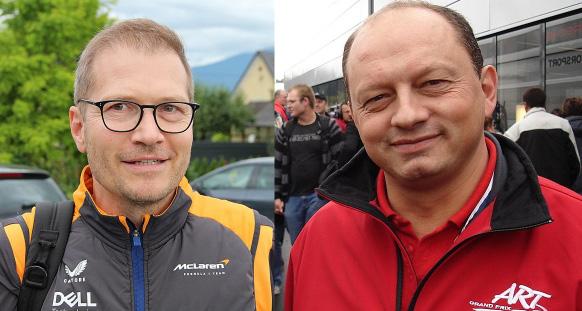 3. MERCEDES
4. ASTON MARTIN
3. MERCEDES
4. ASTON MARTIN